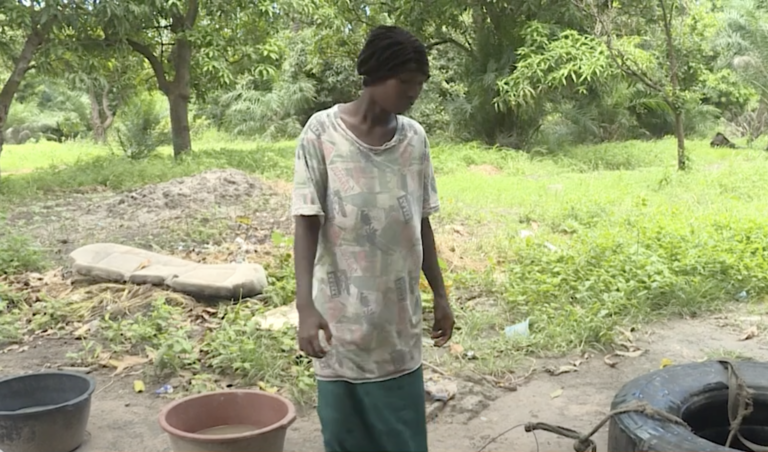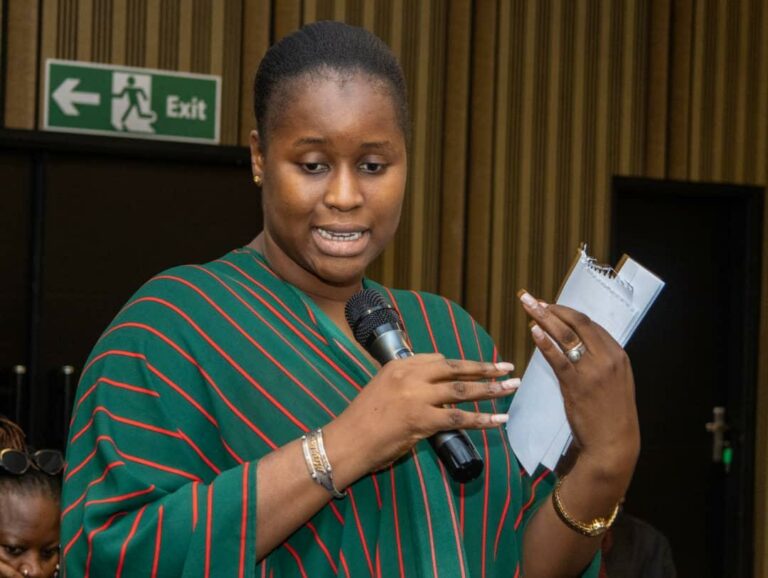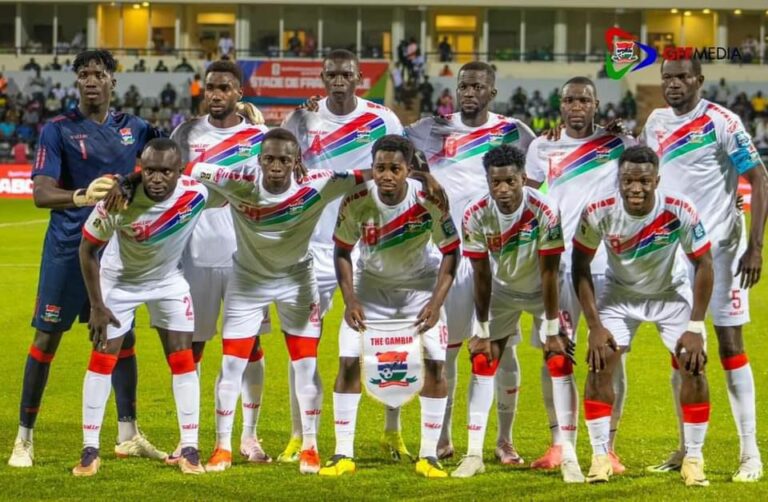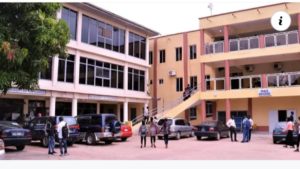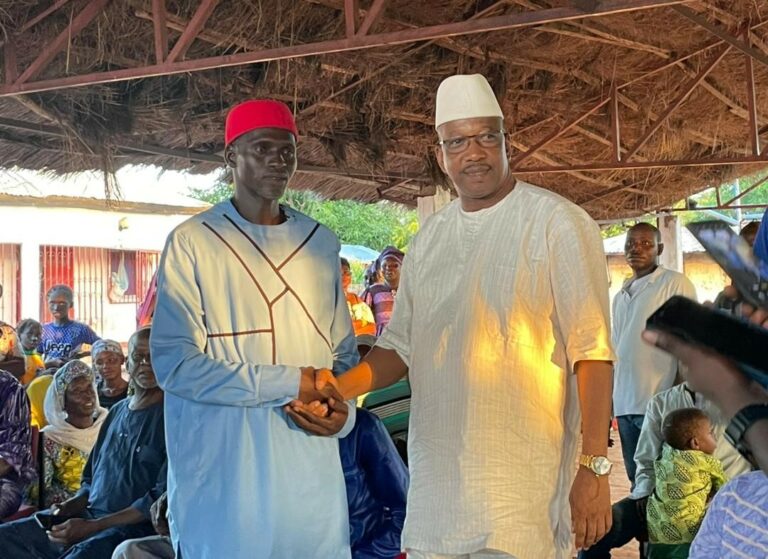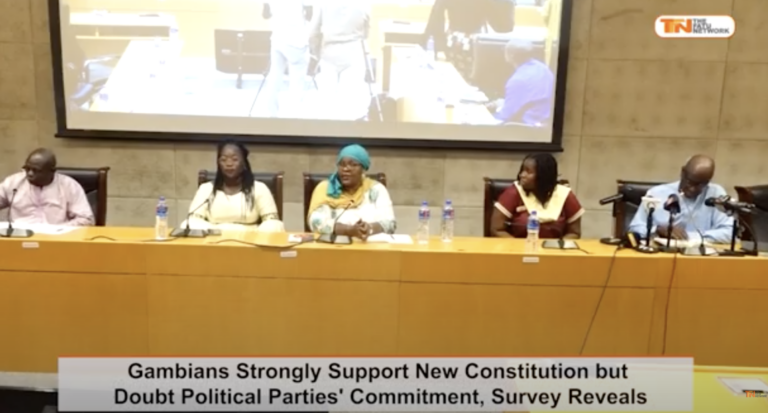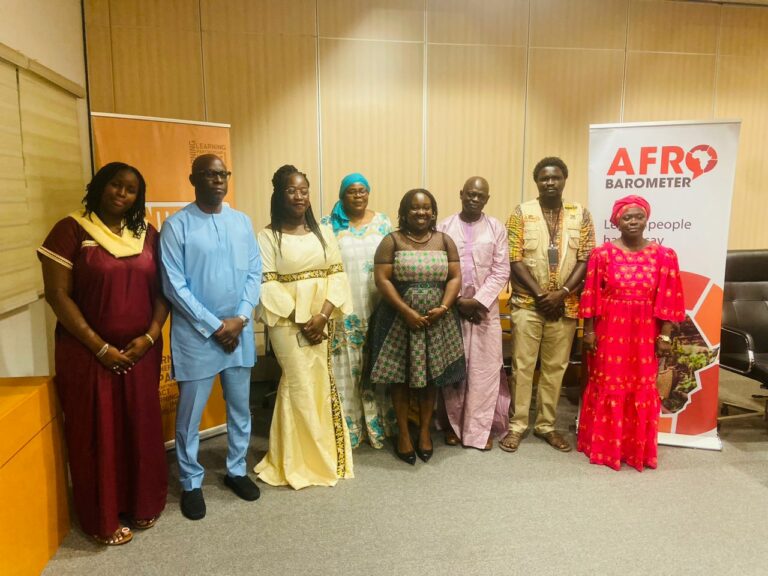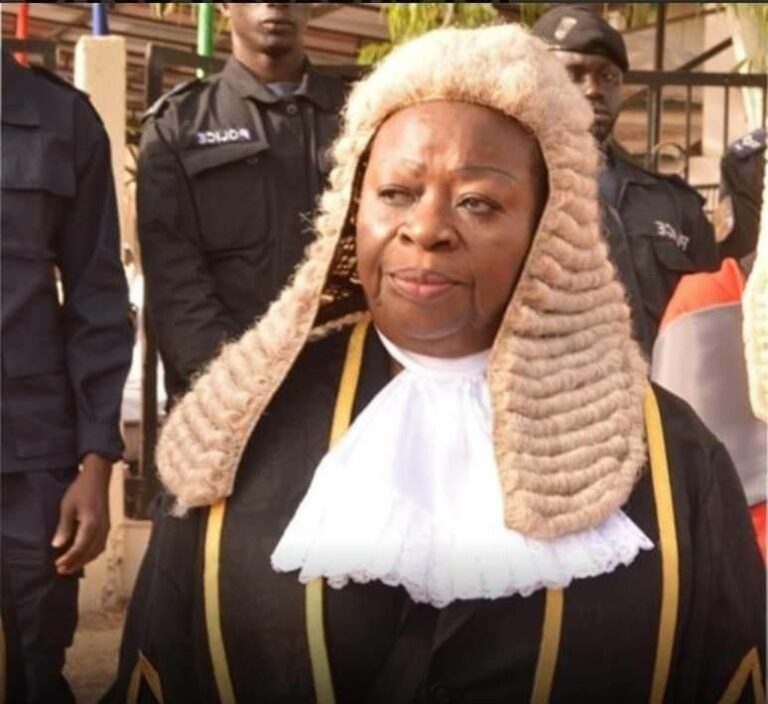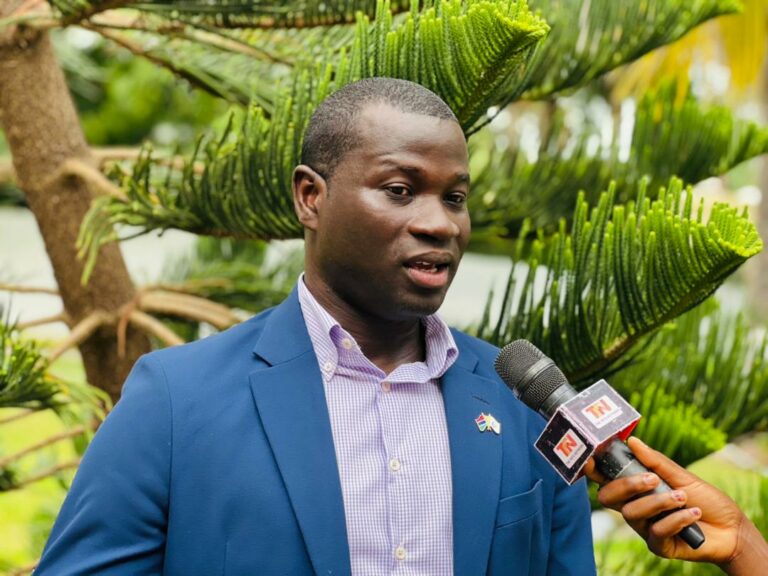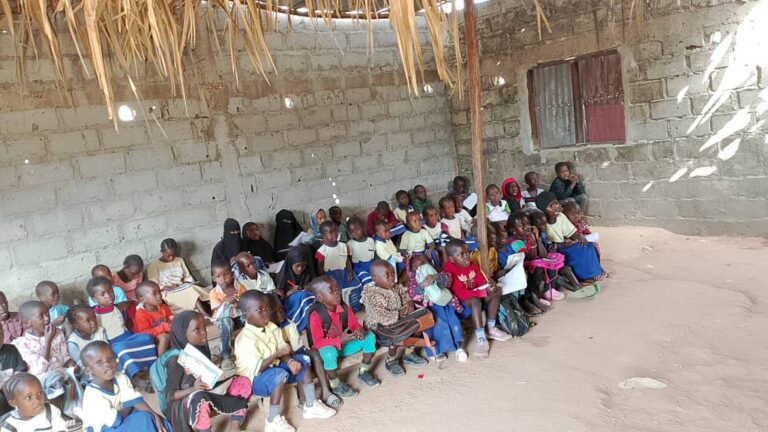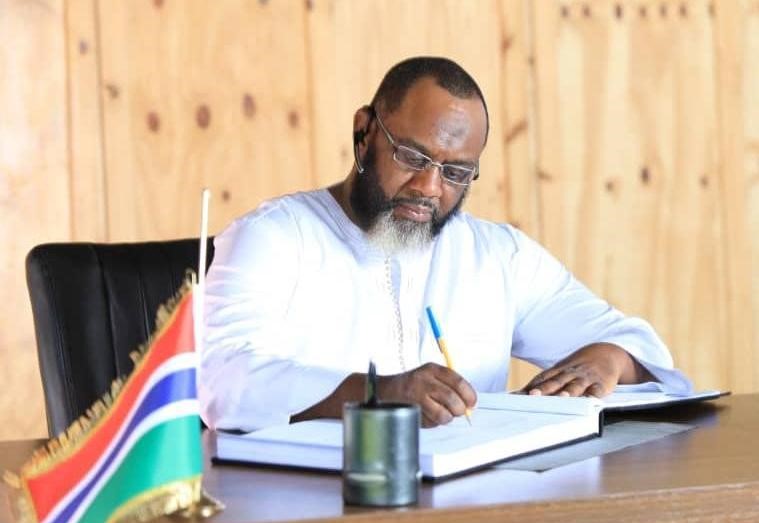Struggle for Food, Water & Shelter: Widow with 7 Desperate for Assistance call: +2203341268
Amie Sanneh, a middle-aged widow, resides in an isolated area in Abuko near the river with her seven children in a house located on a narrow street.
She sells animal waste to make a living.
Struggle for Food, Water & Shelter: Widow with 7 Desperate for Assistance call: +2203341268
Hawa Makasuba, The Gambia’s 25-Year-Old Female Barber Redefining Gender Roles in a Male-Dominated Industry
By Mouhamadou MT Niang
Hawa Makasuba, The Gambia’s 25-Year-Old Female Barber Redefining Gender Roles in a Male-Dominated Industry
Hawa Makasuba, a 25-year-old teacher, makeup artist, and barber from The Gambia, is making waves in a field typically dominated by men.
Despite facing societal challenges and doubts, she has successfully built a thriving barbering business. Hawa balances her multiple roles and uses social media to attract clients, all while providing customer service services.
She shares, “I want to show the world that there’s no fear in pursuing what you love. Barbering brings me income every day, and it helps me take care of my younger siblings.”
Her journey not only inspires other women but also proves that barbering can be a rewarding and sustainable career.
New Afrobarometer Data Shines Light on Gambian Politics: Revealing Gaps in Political Communication and Women’s Participation
By Michaella Faith Wright
Mariama Danso, Executive Director of Fact Check Center – The Gambia, emphasized the communication gaps between politicians and the public, as well as the challenges hindering women’s participation in Gambian politics.
Her remarks followed the release of the Afrobarometer Round 10 data, which provided insight into the state of democracy in the country.
During an event discussing the Afrobarometer Round 10 data, Mariama Danso of Fact Check Center – The Gambia expressed concern about the significant communication gap between political parties and the public. “There is a big gap in communication between the ruling government, opposition, and political parties, which is causing a lack of trust,” she said.
Danso noted that many Gambians are unaware of important developments, such as the draft constitution, and that political leaders are failing to adequately engage with the people. “Most of the conversations we’ve had around the constitutional report show that people are not informed about what is happening,” she explained.
The data also reflected Gambians’ growing mistrust of both local and national leaders. “Trust is an ongoing issue, not just with the central government but also with local government and assembly members,” Danso added.
She also highlighted the challenges women face in participating in politics, citing cultural and societal barriers. “For many women, the primary concern is how to provide for their families, leaving little time or energy for political engagement,” Danso said. She explained that societal pressures often discourage women from entering politics, with many women expressing concerns about how they would be perceived by their families and communities.
“Some women have told us that while they are interested in participating in politics, their husbands won’t allow it, or they fear the societal stigma attached to women in politics,” Danso said. She stressed the need for public awareness campaigns to encourage greater involvement of women in political processes.
Despite these challenges, Danso acknowledged some progress, noting a slight improvement in women’s political participation. “As long as we agree that there’s room for improvement, we can focus on empowering women to actively participate in politics,” she said. She called for initiatives to provide women with the resources and support they need to engage in the political sphere.
Danso also pointed out the lack of communication and trust between the government and the public. She observed that both the ruling National People’s Party (NPP) and the opposition are struggling to provide clear, beneficial information to the public. “There is a gap in communication, and sometimes the government fails to provide information that benefits the public,” she said.
Reflecting on the Afrobarometer data, Danso concluded that Gambians remain committed to democracy and elections, but dissatisfaction with leadership performance is widespread. “Gambians want elections, they believe in democracy, but there is a gap between what people expect and how their leaders are performing,” she said.
Security concerns were another major issue raised during the discussions. “People are directly affected by security issues, and when they raise concerns, they feel nothing is done in response,” Dandso explained. She urged political leaders to address the communication gaps and restore trust between the government and the citizens.
Danso stressed the importance of ensuring that people understand the democratic processes and decisions that affect their lives. “It’s not just about communicating with the public—it’s about making sure they understand the issues and the decisions we make as a democratic country,” she concluded.
Gambia’s Civil Society Pushes for Transparency, Public Engagement in Draft Constitution Review
By Michaella Faith Wright
Annetta Mahoney, a representative from Gambia Participates, has expressed the importance of civil society involvement in the ongoing discussions about the country’s draft constitution, emphasizing the need for transparency and broad public engagement.
Speaking after the release of the Afrobarometer Round 10 data, Mahoney highlighted the growing demand for a new constitution, with 71% of Gambians supporting the call.
Annetta Mahoney of Gambia Participates has underscored the critical role civil society must play in shaping Gambia’s future constitution. Reflecting on the findings of the Afrobarometer Round 10 survey, she noted that the timing of the survey is crucial, as it coincides with ongoing debates over the 2024 draft constitution.
“We know one day people will call on civil society activists, even if it means us scrutinizing the document point by point. Many Gambians have already formed their opinions about the constitution,” Mahoney said, recognizing that views often vary along political or religious lines.
According to Mahoney, political parties have a significant influence on how the public perceives the draft constitution. “Most Gambians tend to follow the perspectives presented by political parties, whether through political or religious lenses,” she said.
With growing public interest in the 2024 draft constitution, Mahoney believes that now, more than ever, civil society must unite to ensure the process is inclusive and transparent.
“Even though some have already discredited the draft, we need to sit together and thoroughly examine it,” she urged.
Mahoney also expressed her gratitude for the Afrobarometer survey, emphasizing its importance in shaping discussions. “The survey has come at a crucial time. We are at a pivotal moment with the 2024 draft constitution under review, and the findings reflect what we’ve known for years — Gambians want a new constitution.”
The Afrobarometer data revealed that 71% of Gambians support the need for a new constitution, echoing a longstanding desire since the rejection of the previous draft in 2020.
In response, Mahoney and her team have been working to facilitate conversations around the constitution. She mentioned efforts by opposition leaders and key stakeholders, including figures like Mr Taal and John Charles, to explore the reasons behind the 2020 rejection and what could be improved in the new draft.
“We’ve convened validation sessions with key stakeholders, producing a position paper. Civil society must continue to stress the need for transparency, inclusivity, and public engagement in the process,” Mahoney emphasized.
Despite not yet reviewing the new draft constitution in detail, Mahoney is confident that civil society will rally to scrutinize it, ensuring it reflects the will of the people. “We need to look at the draft cross by cross, engaging the public and making sure their voices are heard,” she concluded.
McKinstry to Announce 25-Man Squad for AFCON 2025 Qualifiers Against Comoros and Tunisia
By Zackline Colley
Coach Jonathan McKinstry is set to unveil his 25-man squad for the continuation of the Africa Cup of Nations (AFCON) 2025 qualifiers.
The announcement will take place during a press conference scheduled for Wednesday, 28 August 2024, at 12 p.m. at the football house in Banjul.
As the Gambia eyes a third appearance at Africa’s biggest football tournament, the upcoming matches against Comoros and Tunisia are crucial. The Scorpions are currently in a strong position following their performances in the earlier qualifiers.
In their recent encounters, the Gambia secured an impressive 5-1 victory against Seychelles in the World Cup qualifiers, showcasing a solid defensive structure and clinical finishing. This win was crucial in boosting the team’s confidence and position in the group standings.
However, the subsequent match against Gabon in the AFCON qualifiers proved to be a challenging test. Despite a spirited effort, the Scorpions were held to a 3-2 defeat, a result that still kept their qualification hopes alive but highlighted areas that need reinforcement.
With the stakes higher than ever, Coach McKinstry’s squad selection will be closely watched as he balances the need for experience and fresh talent. Fans and analysts alike will be eager to see which players make the cut for the vital fixtures ahead.
The Gambia’s journey to AFCON 2025 has been marked by determination and resilience, and the upcoming matches will be a defining moment in their campaign.
UTG Summons Senior Staff to Disciplinary Committee, Sets 48-Hour Ultimatum for Evidence
By Dawda Baldeh
The Disciplinary Committee of the University of The Gambia has summoned two senior staff members, Dr Alieu Gibba and Dr Matarr Njie, to answer for their criticism of the university’s management regarding purported injustices towards Gambian academic staff and delayed promotions.
They have been given a 48-hour deadline to present evidence regarding their allegations against the university.
In a statement, the university said the accusations made by Dr. Gibba and Dr. Njie have damaged the institution’s reputation.
On June 19, 2024, The Standard Newspaper published a story where the senior UTG staff made various allegations, followed by a publication by The Fatu Network on June 20.
The committee board stated, “You are required to attend the Disciplinary Committee hearing to investigate and address this matter.
“We urge you to provide evidence supporting your claims within 48 hours of receiving this letter, along with valid justifications for why disciplinary action should not be pursued against you,” the office of the vice-chancellor said in a letter seen by The Fatu Network.
As per the letter, the staff’s publications have “from all perceived intents and purposes, tarnished the image of the University and breached the provision of Chapter 9.6.2 of the Conditions of Service, 2007.”
The Fatu Network contacted Dr. Ensa Touray, the UTG Staff Association President, who disagreed with the summoning of Dr. Gibba and Associate Professor Njie.
“This is uncalled for and is purely intended to intimidate the UTG lecturers who have always been very peaceful,” Dr. Touray, the University of The Gambia Staff Association President said.
He added: “What we expected from the Vice Chancellor of the UTG is to respond to the demands of the staff by releasing the promotions.”
Dr. Touray argued that releasing the promotions can stabilize the situation.
He appealed to the government to take swift action and regulate the governance of the university to avoid continuous tension between the university faculties and the management.
“The continuous tension is portrayed as rebellions against the government, and we are very peaceful.
“The governance structures of the university are weak and could lead to a potential threat to our peace and stability,” Dr Touray told The Fatu Network.
Touray further revealed that UTG scholars are suffering under the current Vice-Chancellor Professor Herbert Robertson and appealed for the government to intervene to avoid escalating the situation.
According to Touray, UTG lecturers were asked to apply for promotion to different academic promotions and Dr Alieu Gibba applied to be an Associate Professor while Dr. Njie applied for a Professorship.
GDC Celebrates NPP Defectors; Kandeh Claims NPP is Unhappy
By: Dawda Baldeh
Supporters and sympathizers of the opposition Gambia Democratic Congress (GDC) have rejoiced as defectors from the ruling National People’s Party made their official endorsement on Friday in Jimara.
Addressing a crowd at his hometown in Sare Biorom in Jimara, GDC leader Mamma Kandeh said the ruling party is unhappy with the fact that their strong members are defecting.
These defectors, led by Ebrima Baldeh, now former NPP Julangel Ward Chairperson, made their official endorsement to GDC at a ceremony attended by the party leader, executives, and supporters.
The opposition leader said the day is a joyful moment for his party as the race for the next presidency is getting closer.
Kandeh described the coming of Baldeh and others to GDC as a step in the right direction.
“You are welcome to GDC, and from today, you have equal rights in the party like any other person,” Kandeh said, adding that GDC is open to every Gambian.
He reminded Baldeh and all GDC members that the party doesn’t condone indiscipline, such as politics of insults and attacks.
“Here we respect everyone and we can express our views without using abusive language,” he noted.
The GDC leader further responded to rumors on social media since Baldeh announced plans to join GDC.
“NPP people are not happy because people are leaving their party to join GDC. They forget when they were celebrating as people were leaving GDC to join them.
I heard that some NPP members are accusing Ebrima of stealing, and they are using all forms of negativity towards him. If this were true, how do they keep him in that position for seven years?” he questioned.
Kandeh believed the criticism was due to the fact that Baldeh decided to leave the NPP. “All the attacks on Baldeh are because he left the NPP and joined GDC,” Kandeh asserted.
According to Kandeh, the NPP has failed to acknowledge Ebrima’s contributions to the growth of the party in Jimara.
Ebrima Baldeh, who recently joined GDC, expressed his profound gratitude for the warm welcome accorded to him and his delegation.
He reaffirmed his commitment to assisting GDC in gaining political popularity in Jimara.
Baldeh cited unmet expectations, such as the lack of employment for youths in Jimara, as major factors for his defection, saying that as a ward chairperson, he ran out of excuses regarding promises made to the people of Julangel, which he claimed are being neglected by the NPP.
“You will be surprised to know that Mankamang Kunda, as the home of the President, has a lot of unemployed youths, and they were promised a lot,” he explained.
Hon. Alhagie H. Sowe, former GDC Jimara NAM, and now the party auditor, also joined the rest of the party members in welcoming Baldeh and his delegation to the party.
He said this is a move well calculated and is in the best interest of the country, stating the future of the country lies in GDC.
At the end of the ceremony, Baldeh was appointed as the Constituency Campaign Chairman for GDC, and a brand-new motorcycle was handed over to him to facilitate his movement.
Techniques Ltd. Claims $30,000 from Comium as Rent Arrears
By: Alieu Jallow
In the ongoing legal battle between Technique Limited and Comium, the plaintiff is claiming $30,000 as arrears of rent for the period from 1st December 2021 to 31st August 2022.
The plaintiff is equally claiming damages for what it described as breach of contract, mesne profit from 1st December 2021 to the date of judgment. This application was awarded costs at the interest rate of 25% from the 1st day of December 2021 to the date of judgment, and thereafter 4% interest on the judgment sum until the date of payment.
Particulars of Claim
The plaintiff is a limited liability company incorporated in The Gambia and has its registered address at Sankung Sillah Road, Kombo Saint Mary Division, The Gambia, while the defendant is a GSM company situated at No. 27 Kairaba Avenue, KSMD, The Gambia.
By a tenancy agreement dated 3rd August 2006, the plaintiff offered to let, and the defendant agreed to take up tenancy of the rental premises for a period of 15 years. It was a term of the said agreement that the defendant would pay rent of $110,000 (one hundred and ten thousand dollars) per annum for the first five years, with an increment of $5,000 (five thousand dollars) for the next five years, and so on. At the trial, the plaintiff would rely on the said tenancy agreement for its full force and effect.
According to the plaintiff, the said tenancy agreement was for a duration of fifteen years, which was also to be renewed since December 2021. However, the defendant failed to renew the tenancy and wrongfully continued to occupy the rental premises and carry on business thereat at the plaintiff’s expense. The plaintiff avers that it reminded the defendant on numerous occasions to regularize the tenancy, i.e., to renew the same or vacate, but they simply kept giving excuses, delaying payment, and above all, pleading for a discount on the agreed rent based on purported financial constraints.
According to the plaintiff, after numerous reminders and correspondences between the parties regarding the renewal of the tenancy, the plaintiff sent a copy of the new tenancy to the defendant in January 2022 to be signed.
Despite receiving the copy of the said tenancy agreement, the defendant failed and neglected to sign the same and raised baseless excuses. To the utter surprise of the plaintiff, the defendant sent their own version of a draft contract, which contained unreasonable terms therein, which was categorically rejected by the plaintiff. As a result of the defendant’s unreasonable conduct, the plaintiff instructed its solicitors to take the necessary action against the defendant. By the date 25th March 2022, the plaintiff’s solicitors wrote to the defendant and demanded payment for arrears on rent and also reminded the defendant of their obligation under the tenancy.
Additionally, the defendant paid to the plaintiff’s account the sum of $60,000, leaving an outstanding balance of $30,000 for the rent for the period from 1st December to August 2022. The plaintiff asserts it was surprised by the receipt of a lesser sum than the actual amount to be paid by the defendant, thus causing their legal practitioners to initiate another letter dated 19th May 2022 to demand immediate payment of the said balance from the defendant.
The defendant made promises and negotiated with the plaintiff to bear with them and allow them to pay the rent in installments rather than the whole sum for that period. The landlord allowed a short period for the defendant to come up with the rent, considering their longstanding relationship. Notwithstanding the grace period availed to the defendant, they failed to pay. The plaintiff claimed that the defendant’s unreasonable conduct and neglect to pay their rent due has caused them damages, thus incurring over D150,000 for instituting this suit against the defendant. In light of this, the plaintiff is claiming the recovery of $30,000, equivalent to D1,620,000, damages for breach of contract, mesne profit from December 1st, 2021, to the date of judgment, and D150,000 being fees incurred for this action.
In her ruling today, Principal Magistrate Isatou Sallah Mbye awarded costs of D5,000 to the plaintiff following the defendant’s legal representative seeking an adjournment.
Gambians Strongly Support New Constitution but Doubt Political Parties’ Commitment, Survey Reveals
Gambians Strongly Support New Constitution but Doubt Political Parties’ Commitment, Survey Reveals
71% of Gambians call for new constitution, Afrobarometer survey reveals
By Zackline Colley
Amidst The Gambia’s continued efforts to fortify democracy and advance transitional justice, fresh data from the Centre for Research and Policy Development has revealed substantial public backing for reforms, accountability, and democratic governance, with 71% of Gambians in favour of adopting a new constitution.
The survey signalled widespread endorsement of a legal framework that could solidify the country’s democratic gains.
The push for constitutional reform has been critical to The Gambia’s transition from autocratic rule to democracy. Following the end of Yahya Jammeh’s 22-year regime, which was marred by human rights abuses and suppression of political dissent, Gambians have been eager to rebuild their nation’s governance structures on a more democratic foundation.
The proposed constitution, which has yet to be adopted, includes provisions aimed at limiting presidential power, strengthening checks and balances, and ensuring greater protection of human rights.
Alongside constitutional reform, the Truth, Reconciliation, and Reparations Commission (TRRC) has been a pivotal element of The Gambia’s journey toward justice. The TRRC, established to investigate human rights abuses during Jammeh’s rule, has garnered increased public attention and support. Compared to 2018 and 2021, more Gambians are now calling for those accused of crimes against humanity and other severe human rights violations to be held accountable. This shift reflects a growing demand for justice and accountability as the nation seeks to heal from the wounds of the past.
Moreover, the commitment to democracy in The Gambia remains robust. A large majority of citizens continue to express support for democratic governance and emphasize the importance of holding the government accountable. Notably, a majority of Gambians believe that government accountability should be prioritized, even if it results in slower decision-making processes. This perspective underscores the public’s preference for transparency and accountability over expediency in governance.
The findings also highlight the Gambian people’s rejection of non-democratic alternatives, reinforcing the nation’s dedication to maintaining a democratic system that respects the rule of law and fundamental freedoms.
As The Gambia moves forward with its reform agenda, the widespread public support for a new constitution and transitional justice measures indicates a collective desire to establish a governance system that reflects the aspirations of its people. The challenge ahead lies in translating this public support into concrete actions that will ensure a stable, just, and democratic future for all Gambians.
Unexpected Defection: Former NPP JULANGEL Ward Chairperson Resigns and Joins GDC
By: Alieu Jallow
In a surprising turn of events, a prominent ward chairperson of the National People’s Party, on Wednesday, August 21, 2024, tendered his resignation and declared allegiance to the Gambia Democratic Congress (GDC). This unprecedented move raises questions about the ruling party’s unity and the opposition’s growing influence.
In a telephone interview, Ebrima Baldeh, a figure known for his unwavering loyalty to the ruling party (NPP), said that his move was triggered by unmet expectations from the NPP. He outlined that he has run out of excuses regarding some of the expectations from the party.
“I thank the NPP, but I am going to someone who is willing to help Gambians move forward because we are all Gambians and we need Gambians to move forward. If you become president, people expect a lot from you in terms of development and alleviating hunger and poverty. This is why I left the party and joined GDC,” he asserts.
The ward, previously considered a stronghold for the ruling party, may now face a fiercely contested election that could shape the trajectory of politics in the region. Mr. Baldeh vowed that his newly-found party is the right party to salvage his people.
“Let them understand from me that the property given by the NPP party is taken away from me. This is a sign of betrayal, and if they give you a position and you work for them for years, if they happen to give you anything, they take it back. So let them understand it that way: it’s not the best party to follow,” he alleged.
Baldeh, who was full of praise for the NPP for the opportunity to work with them for years, outlined that moving forward, his focus is shifted to advancing the agendas of the GDC, emphasizing that the party has fulfilled, so far, most of the promises it made to its followers.
Meanwhile, many believe that the timing of this defection is particularly sensitive as the country gears up for the 2026 Presidential election. The ruling party now faces an uphill battle in reaffirming its dominance and retaining the trust of its loyal supporters in the Julangel ward.
Tribute to Lady Justice Mam Yassin Sey- A Fearless Woman of the Law!
By Ba Tambadou
Former Attorney General
It is with sadness that I learned about the passing of Mam Yassin Sey, Lady Justice of the Supreme Court of The Gambia.
After the elections in December 2016 and the political impasse that followed, which exposed and underscored the critical role of The Gambia’s Supreme Court in the nation’s governance system, there was an urgent need to revamp the Supreme Court. The lack of a quorum in the Court and the search for foreign judges to preside over the elections petition case during the political impasse made headlines around the world and became a national embarrassment. We were therefore desperate and determined to show the world that our country, albeit small, had good and decent people capable of serving at all levels of our judicial system including the Supreme Court. We wanted Gambians of high repute, competence and standing to serve in the country’s highest court. We started to search for potential candidates in and outside the country. It was easy for me to identify Justice Mam Yassin Sey as a good judge for our revitalised exclusively Gambian Supreme Court. She had demonstrated on many occasions that she was an independent, competent, fearless, fair and courageous arbiter of the law. She exemplified Lord Denning’s characterisation of a “bold spirit who was ready to allow it if justice so required”. She wasn’t afraid to make difficult decisions no matter the circumstances and even at the risk of losing her job. As one senior lawyer told me, “she was a legal warrior”.
My admiration for justice Mam Yassin Sey was shaped by two encounters with her. The first one occurred back in April 2000 during the students’ demonstration. At the time I was a young lawyer full of passion for justice and human rights and a great deal of reckless energy. When my colleagues and I created the Coalition of Lawyers for Defence of Human Rights under the leadership of lawyer Ousman Sillah, and others like Mariam Denton, Amie Bensouda, Awa Sisay Sabally and Emmanuel D. Joof, we decided to challenge the illegal detention of hundreds of students across the country. We had no instructions from the students or their families. We decided to act pro bono based on our collective conscience and sentiments about the tragic events in the country at the time. A number of students were killed during the protests and a lot more were arrested and detained for weeks. When we filed the case at the high court seeking declarations about the illegal detention of the students and requested for their immediate release, we wondered which judge was going to be assigned the case and, more importantly, if he or she will be brave and courageous enough to make the declarations and to order for the release of the students. It was a very tense period in the country and the stakes couldn’t have been higher. The country was in shock over the killing of unarmed school children in broad daylight and the detention of many more. The government had reacted in such a callous manner because it believed that it was under threat and was therefore determined to crush the threat by any means. The events were unprecedented in The Gambia’s recent history. No one knew what was going to happen next. It was in this tense atmosphere that Justice Mam Yassin Sey was called upon to take a position as the high court judge who was assigned to preside over the case. Before this case, I had appeared before Justice Mam Yassin Sey only once in my very first case as a private lawyer at the high court in a civil matter. I therefore knew little about her and wondered if she was the one. The case was set for hearing and all the lawyers of the Coalition were present in court on that day. There were about ten of us. The courtroom was packed full of families of the students and the press. Our lead counsel lawyer Ousman Sillah made his submissions on our behalf and thereafter the State, which had unsuccessfully attempted to delay the proceedings by requesting an adjournment, strongly opposed our applications for a declaration and release of the students. On the same day soon after the respective submissions by lawyer Ousman Sillah and the State, and unusually for courts in The Gambia at the time, and in the best traditions of the legal profession, Justice Mam Yassin Sey came up to deliver her ruling. It seemed that she had either pre-determined the issues in view of the facts of common knowledge about the killings and mass arrest of students across the country or that it was such a straightforward matter for her that she didn’t need to think long about it since the issues involved the liberty of individuals. Either way, she delivered her ruling with profound dignity, judicial eloquence and the highest standards of competence and professionalism. Without fear, she granted our application and issued a declaration that the arrest and detention of the students violated their fundamental human rights under the 1997 constitution and ordered for their immediate release from custody. We were elated and relieved. Finally, here is a judge who was not afraid to do the right thing even at the risk of losing her job. By this single act of courage and fearlessness, Justice Mam Yassin Sey rekindled my faith in the law. For her though, the issue was simply about justice and legality and nothing else mattered. I wished it were that simple for many of the judges who served our country in those days. The students were subsequently released a few days after her ruling.
My second encounter with Justice Mam Yassin Sey occurred not long after the April 2000 students case, in the matter of the State against Ousman Dumo Saho who was arrested and detained for a prolonged period without trial. He was accused of involvement in a coup plot against the government together with others including Lt Lalo Jaiteh and Lt Dabo. The State’s star witness was a certain Francisco Caso who had come to the country as a businessman in the tourist industry and ended up as the military instructor for the “Junglers”. When Dumo was disappeared and his family and Swedish wife Annika Reinberg could not trace him because all the security services had denied that he was in their custody, I was instructed to act on his behalf. I was joined initially by Emmanuel D. Joof and then subsequently by lawyer Ousainou Darboe during the trial. Upon being instructed, I filed an application before the high court seeking a number of reliefs including that the arrest and continued detention without trial of Dumo Saho violated his fundamental human rights. The case was assigned to Justice Mam Yassin Sey. Based on our prior experience of appearing before her in the April 2000 students case, Mr Emmanuel Joof and I were hopeful that she will do the right thing yet again. True to form, she didn’t disappoint. She rose to the challenge and granted our application. She declared that the arrest and continued detention without trial of Ousman Dumo Saho violated his fundamental rights under the 1997 constitution. Her ruling paved the way for the start of the treason trial that followed and allowed us access to our client at the Mile 2 prisons.
These two cases illustrated her courage and fearlessness. For a better appreciation of the risks Justice Mam Yassin Sey took to serve the ends of justice, we must view her actions in their proper context at the time. Summary dismissal of judicial officers was commonplace sometimes for very flimsy reasons. The political atmosphere was constantly charged, and the government was becoming increasingly intolerant of dissent or alleged threats to their power. There was particular dislike of the courts which were seen as providing the platform for potential check against executive abuse and no effort was being spared to emasculate the judiciary especially in relation to cases that the government deemed “political”. It was in this hostile environment that Justice Mam Yassin Sey delivered her rulings in these two cases and in many others at the time. So even in the darkest days, there were decent Gambian men and women who were guided at all times by conscience and conviction. Justice Mam Yassin Sey was at the top of that list. Unfortunately for our country, her qualities were in demand elsewhere and she subsequently left our shores to serve others.
I remember when I called her in Vanuatu in early 2017 to request her to come back home to serve as a Supreme Court judge. She was excited about it. She didn’t hesitate and never asked about the conditions of service or anything else. She was just happy to have been asked to return home to help rebuild our country. Like many of us who also came back home from abroad following the change of government in December 2016, it was an honour and a privilege to serve our people. Despite the attractions of a better paid job and life abroad, she couldn’t turn it down. It was the mark of a true patriot. The Gambia has indeed lost a good daughter.
May her gentle soul rest in peace.
Can Michelle Obama’s Influence Propel Kamala Harris to Victory in 2024?
OPINION
By Michaella Faith Wright
As the 2024 U.S. presidential race intensifies, Michelle Obama has once again stepped into the political spotlight, delivering a powerful speech that has sparked conversations about the future of American leadership. With Kamala Harris positioning herself as a potential contender against Donald Trump, the question arises: will Michelle Obama’s influence be the deciding factor in helping Harris secure victory in the upcoming election?
Michelle Obama, the former First Lady, captivated the audience with her speech that highlighted the core values of democracy, unity, and the importance of standing up for the future of America. While her words were primarily focused on promoting civic engagement, many political analysts couldn’t help but wonder about the deeper implications of her speech on Kamala Harris’s presidential ambitions.
Michelle’s influence on American politics has remained significant long after she departed from the White House. Her charisma, credibility, and ability to connect with voters have made her one of the most influential figures in the Democratic Party. As Kamala Harris navigates the complexities of the 2024 race, Michelle Obama’s backing could provide a crucial boost.
Harris, who is seen by many as the natural successor to Joe Biden, faces the formidable task of going head-to-head with Donald Trump if he runs. political bases remain strong, and his rhetoric continues to dominate headlines.
However, with Michelle Obama’s track record of galvanizing key demographics, such as ministry voters, women and young people, her support for Harris could ever be a game-changer
Obama’s speech also touched on the importance of empowering women leaders, which further leaders, which further aligns with Kamala Harris’s narrative as the first woman and first woman of colour to serve as U.S. Vice president. Harris has long championed issues such as healthcare reform, climate change, and social justice, areas that also resonate with Michelle Obama’s advocacy.
But will this influence be enough to help Harris over some of the political behemoth that is Donald Trump Political? experts are divided. Some believe that Obama’s endorsement and active campaigning for Harris could swing the election in her base is too loyal and energized to be swayed-the election in her favour, while others argue that Trump’s base is too loyal and energized to be swayed by any endorsement no matter how high profile.
As the race continues to unfold, one thing remains certain. Michelle Obama’s voice will be a powerful force in shaping the narrative of the 2024 election. Whether or not that will be enough to carry Harris Kamala to victory is a question only time to answer.
Minister of Youth and Sports Advocates for Infrastructure Development in New National Sports Policy
By: Zackline Colley
The Gambia’s Minister of Youth and Sports, Bakary Badjie, has emphasized the critical need for sports infrastructure development as the country unveils its first-ever national sports policy. The Gambia National Sports Policy 2024-2034, a blueprint designed to elevate the country’s sports sector over the next decade, marks a significant milestone following the expiration of the previous policy in 2019.
Speaking at the policy validation ceremony, Minister Badjie underscored the importance of prioritizing infrastructure investment over international participation to ensure long-term success and talent development at both the national and community levels.
“The one that I am very particular about is the issue of the sports infrastructure development. Over the decades, we have all observed how our lack of infrastructure has affected our performance and our talent development at the community level,” Badjie stated.
The minister highlighted the challenge of balancing the budget between funding international participation and investing in local infrastructure, noting that the current approach often leaves the country underprepared and without the necessary facilities to train athletes effectively.
“Strategically, if you have one international competition, where, for example, you are spending 3 million or government gives 3 million, I would say that 3 million can build a basketball or volleyball or tennis lawn or something else somewhere. But do we use it for that, or do we use it to send a group to go and participate?” Badjie questioned.
He further explained that continued investment in international participation without adequate infrastructure at home could lead to poor performances, as athletes would not be accustomed to the facilities they encounter abroad.
“Our position as a ministry is that we need to invest more in the development of the infrastructure at home and minimize the participation. We do hope that in the next three years, in the next four years, we will have had some adequate or at least reasonable facilities and be able to develop the talent locally,” he said.
The new policy, which was developed after extensive consultations with stakeholders, encapsulates the vision and aspirations of The Gambia’s sports community. It aims to provide a framework for the growth and development of sports in the country, ensuring that future generations of athletes are well-equipped to compete on the global stage.
Minister Badjie expressed hope that with proper infrastructure in place, The Gambia would be able to develop a pool of well-trained athletes who can excel in international competitions.
“In the next two, three years, we will be able to go out there and be able to do well. And our position as a ministry is that we need to invest more in the development of the infrastructure at home and minimize the participation,” he concluded.
The Gambia National Sports Policy 2024-2034 is set to chart a new course for the sports community, focusing on building a robust foundation that will enable the country to achieve sustained success in the years to come.
Music Producer JLive Clears the Air on Dispute with Miz Jobiz
By: Zackline Colley
In a candid interview, renowned music producer JLive addressed rumors surrounding his past working relationship with artist Miz Jobiz. The dispute, which has been a topic of speculation within the music industry, centered on the alleged refusal by JLive to release a song created in collaboration with Miz Jobiz.
JLive explained that the situation stemmed from a misunderstanding about the ownership and financial aspects of the music they created together. According to the producer, while he had provided Miz Jobiz with the songs she initially requested, tensions arose when she sought additional tracks without compensating him fairly.
“The thing is simple,” JLive stated. “I had to give her a song to clarify. I gave her the song she wanted. But she wanted more of the songs—songs which we created together. So I told her straight off that to get those songs, there’s a limited amount that you need to pay. Because at the end of the day, it’s my work, and it’s your work.”
JLive emphasized that his request for payment was reasonable and not excessive, even for an upcoming artist.
Addressing the lack of formal agreements in their collaboration, JLive shared that their partnership was built on mutual trust and potential rather than contractual obligations. “Since I started working with Jobiz as a talent, with the videos and the investment, there was no agreement,” he said. “You see somebody and say this person could be a great person in the future, and you start working with the person. Some people will say it’s very stupid for somebody to do that, but that’s somebody you have love for.”
Despite the fallout, JLive clarified that there are no lingering hard feelings between him and Miz Jobiz. He confirmed that he has since handed over all the songs they worked on together and that their professional relationship has come to an end.
“There is nothing between us at the moment,” JLive concluded. “We might meet somewhere and greet each other, but there is no work relationship between us anymore.”
The revelation sheds light on the complexities of collaborations in the music industry, where creative partnerships can sometimes unravel over financial disagreements and differing expectations. As for JLive and Miz Jobiz, while their professional paths have diverged, the respect they once shared may still linger in their future encounters.
Madiana Besiyaka Nursery School is in dire need of furniture and teaching materials
By: Alieu Jallow
Recognizing the importance of early childhood education and the crucial role it plays in fostering young minds, Madiana Besiyaka Nursery School in Madiana, Kombo South, has called for support as the school grapples with a poor teaching and learning environment.
According to the teacher in charge, Fatou Bojang, the nursery school was initiated to provide early education and care to young children, giving them a foundation for a successful future as the school in the village, with the nearest primary school approximately 4 km away.
The young lady, who is struggling to even receive a proper salary, noted concerns that the school is grappling with a deteriorating roof of raffia palm that leaks whenever it rains. Similarly, she had to improvise furniture by using planks or timber and cement blocks for children to sit on during teaching and learning, which, according to her, is not suitable for young children.
“The school consists of unfinished classrooms with no furniture, very terrible windows, raffia leaves as a roof, an uneven floor with slopes, and the school lacks proper chalkboards that will facilitate proper teaching and learning. The sad reality is that our students are kids and deserve to be taught in a conducive environment,” she decried.
Madam Bojang further outlined that learning activities are mostly disrupted due to the poor condition of the school, especially during the rainy season.
“The problem that we are encountering recently is the lack of furniture, teaching boards, and the floor is not well prepared. With our 75 pupils in one block classroom that is without a roof, when it rains, our classes are disrupted.”
Additionally, she and her colleague decried the lack of proper teaching materials such as books, chalk, and educational resources, thus forcing them to levy D100 per term to buy some of the materials, which has affected their overall education and development. She said that teachers sometimes go without a salary for months, as their salaries are derived from the D100 fees levied on pupils, but the community and parents decried poverty.
“The community and the school agreed to levy D100 per term for a child. From that money, I’m paid, and the balance is used to buy chalks, a drinking bucket, a duster, and a register. But this was only once, after which the payment was never forthcoming, and if you ask parents, they will always tell you that they don’t have money. I have been teaching without a salary simply because of the love I have for these children.”
The nursery school plays a crucial role in the community by providing early education and care to young children, giving them a foundation for a successful future. However, without a good roofing structure, suitable furniture, and teaching materials, the school’s ability to fulfill its mission is severely compromised.
Miss Bojang said the authorities must take immediate action to address the dire needs of the nursery school in Madiana, as providing a safe and conducive learning environment is not only a basic necessity but also a fundamental right for every child. The future of these young children should not be jeopardized; thus, schools should allow the authorities and philanthropists to come to their aid as they resume school after the summer holidays.
“We hope that our plight will be addressed, and your support will do so much for our school and, most of all, for our pupils. This will surely benefit not just the school community but also the community that our school serves to shape the younger generation to make a significant difference for a better future,” she appeals.
15 women charged with ‘idle and disorderly’ conduct
By Alieu Jallow
Magistrate Isatou Sallah Mbye on Wednesday charged and fined 15 young women, mostly Nigerian nationals, for engaging in “idle and disorderly” conduct.
According to the Prosecution, on or about August 10th, 2024, Faith Mosses, Esther Agudosi, Joy Rice Kumba Sarr, and 32 others within the jurisdiction of Kanifing Municipal in the Republic of the Gambia were found idle and disorderly contrary to section 166(e) of the criminal code cap 10:01 volume 3 laws of the Gambia.
Sergeant Amadou Baldeh, on behalf of the IGP, informed the court of the police initiative to target criminal hideouts. A joint task force was formed following a tip-off that a significant amount of criminal activity was cantered around motels and brothels in Kanifing, leading to the deployment of a patrol team.
Sergeant Bah said the patrol team, while at West Field, found Kumba Sarr at West Park at around 22:00 hours and couldn’t give any convincing reasons for being within the vicinity; thus, she was arrested and taken to the Serrekunda police station. He further informed the court that the patrol team proceeded to City Pop, Senegambia New Road and Kololi Taban, where they arrested several other people.
After reading the statement of offence, 15 people pleaded guilty while 21 others pleaded not guilty. In her ruling, Magistrate Sallah Mbye said the 15 who pleaded guilty were honest in their plea and thus pleaded with the court to tamper justice with mercy, with some of them pledging to quit the business and be law-abiding.
She convicted them and fined them D1000, and in default, they will be remanded in Mile 2 for one month, and for the non-Gambians, if there is any repeat of such act, they will be deported.
The matter is adjourned to Thursday, 29th August 2024, for bail determination and possible hearing for the 21 others.
Draft 2024: GAP Shares Input, Calls for Transparency and Inclusivity
By: Dawda Baldeh
As the country progresses with the drafting of the 2024 constitution, the Gambia Action Party (GAP) has provided its input, emphasizing the importance of transparency and inclusiveness.
GAP leader Musa Ousainou Yali Batchilly highlighted the significance of this monumental task, stating that the future governance, rights, and development of the country depend on the success of this constitution.
GAP emphasized that to create a document that reflects the aspirations of all Gambians, the process must involve comprehensive national consultation, inclusivity, and transparency.
Below are the key areas that GAP believes will contribute to the success of the draft constitution:
- National Consultation Involving All Political Parties and Stakeholders
The 2024 draft constitution should result from extensive national consultation, engaging all political parties, civil society organizations, traditional leaders, religious institutions, and other relevant stakeholders.
This process should not be merely ceremonial but should encourage meaningful dialogue where every voice is heard.
By doing so, the government can ensure that the constitution is not just a legal framework but also a true representation of the collective will and diverse perspectives of the Gambian people.
This inclusive approach will promote national unity and enhance public trust in the constitution, leading to its effective implementation.
- Ensuring Inclusion, Consultation, and Transparency
Throughout the constitutional process, the government must prioritize inclusion, consultation, and transparency.
This involves providing clear and accessible information to the public, actively seeking input from all sectors of society, and addressing concerns with openness and accountability.
Transparency is crucial in building confidence among the population that their opinions matter and that the government is dedicated to developing a constitution that serves everyone equally.
Only through a transparent process can the objectives of a constitution that upholds democracy, justice, and the rule of law be achieved.
- Empowering Key Sectors Through the Constitution
As the draft constitution is finalized, it should focus on empowering key sectors essential to the nation’s progress.
Provisions within the constitution should strengthen sectors such as health, agriculture, infrastructure, and education.
A strong health sector is crucial for a healthy nation, while a thriving agricultural sector is vital for food security and economic stability.
Infrastructure development is needed to connect communities and drive economic growth, and a robust educational system is fundamental for nurturing future leaders.
By incorporating clear and actionable commitments to these sectors in the constitution, the government can ensure that future policies and investments align with national priorities, promoting long-term progress and prosperity for all Gambians.
In conclusion, the 2024 draft constitution presents an opportunity for The Gambia to establish a more inclusive, prosperous nation. It is a chance to create a legal framework that not only represents the collective will of the people but also sets the foundation for sustainable development in critical sectors. The government is urged to approach this process with openness, inclusivity, and a commitment to the nation’s best interests.
Female Barber Hawa Makasuba Challenges Stereotypes in The Gambia
By: Michaella Faith Wright
Hawa Makasuba, a 25-year-old Gambian teacher, makeup artist, and professional barber, is breaking boundaries in the male-dominated world of barbering. Despite societal challenges and skepticism, Hawa has built a thriving business, demonstrating resilience, dedication, and a passion for her craft.
Born and raised in The Gambia, Hawa Makasuba found her passion for barbering a few years ago. While balancing her roles as a teacher and makeup artist, she ventured into barbering to supplement her income and pursue something she genuinely enjoys. Now, at 25, Hawa is committed to this unconventional career path, undeterred by the criticism she faces as a female barber in a male-dominated field.
In an interview with The Fatu Network, Hawa shared some of the hurdles she encounters in her profession. “The first challenge is how people perceive me, and second, the way society passes judgment,” she said. Despite the doubts and rumors, Hawa stays focused on her work. “I do this because I like it, and it helps me pay the bills. Sometimes, you just need to ignore the noise and keep doing what you love.”
Hawa has also encouraged other women interested in the barbering profession, urging them to stay determined. “My message to all the females who want to enter barbering is to stay focused and dedicated. It pays off. Critics are normal in society, but as long as you’re committed, you’ll achieve your goals,” she advised.
With her barbering business thriving, especially during busy seasons like Tobaski and Christmas, Hawa continues to serve clients who seek popular styles like high fades and low cuts. She also emphasizes the importance of customer service in building loyalty, adding that her professionalism and patience have earned her a steady flow of clients. “When customers come to my shop, I make sure they feel welcome and comfortable. That’s one of the reasons I’m not losing customers.”
However, the rainy season presents challenges, as business tends to slow down during this period. To keep attracting new customers, Hawa promotes her work on social media platforms such as TikTok, Facebook, and WhatsApp. Despite her shop being located far from the city, she has managed to maintain a loyal customer base.
As a female barber, Hawa hopes to inspire others by showing that passion and dedication can break societal barriers. “I want to show the world that there’s no fear in pursuing what you love. Barbering brings me income every day, and it helps me take care of my younger siblings,” she said. Her success story proves that barbering is not just a hobby but a sustainable career, especially when one is determined to make it work.
Despite societal criticism, Hawa remains focused on her goals. She continues to thrive as a teacher, makeup artist, and barber, employing assistants to help manage her growing business. “I want to see more women in barbering, not just in The Gambia but across the world,” she concluded.
Whither The Gambia? – The Saga of a Small Nation and its Missing Oil and Gas Resources
- Editorial
- Africa
- Analysis & Comments
- Featured
- International
- News
- Politics
- Special Reports
- The Gambia
- Top Stories
By: Ousman F. M’Bai
Financial Crime, Regulation & International Asset Recovery Lawyer/UK
Founder: ProffMaxx (Gambia) Ltd (Ground Water Drilling Exploration & Production)
The MSGBC
The MSGBC basin has been one of the world’s most prolific regions for oil and gas discoveries, until the recent unprecedented oil discovery in Guyana surpassed it. The basin is estimated to hold about two billion barrels of oil and 25 trillion cubic feet of gas. Located onshore and offshore on the Atlantic coast of West Africa, specifically between Mauritania and Guinea Conakry, MSGBC is an acronym for the countries that comprise the onshore part of this geological province with interconnected maritime boundaries: Mauritania, Senegal, The Gambia, Guinea Bissau, and Guinea Conakry.
The basin covers a total land mass of about 340,000 km² and an estimated offshore area of 100,000 km² with water depths between 2000 meters and 4000 meters. This offshore area spans over the AGC (Agence de Gestion et de Coopération entre le Sénégal et la Guinée-Bissau), a joint maritime zone between Senegal and Guinea Bissau.
The basin is not a single continuous span but consists of three major connected subbasins:
- Mauritania Offshore Basin: This basin stretches from the north of Mauritania down to the Senegal River in the southern border between Senegal and Mauritania.
- Northern or Senegal/Gambia Subbasin: Located between the Senegal River and the River Gambia. The specific area of the subbasin relevant to this article is between the River Gambia and River Saloum.
- Southern Senegal/Guinea Bissau Subbasin: Extending south from the river Gambia through the Casamance region into Guinea Bissau.
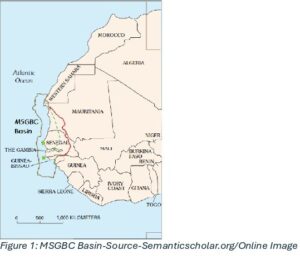

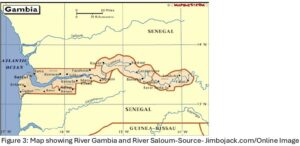
Geology of the MSGBC Basin
The basin developed in complex stages over millions of years, beginning with the opening of the North Atlantic and the splitting of North America from Eurasia and Africa during the late Permian to Early Triassic period. This process continued into the late Jurassic when the breakup of Africa from South America began, culminating in the opening of the Atlantic, which was completed in the Albian period. Marine deposits began forming in the early Jurassic in Morocco, advancing southward as the sea encroached on the land, reaching the southernmost edge of the basin in the late Jurassic. The rock formation after the split is identified as ranging from the middle Jurassic to the Holocene, consisting of a carbonate-rock unit with varying thicknesses between 2,300 meters and 3,200 meters in the three subbasins.
During the Albian, carbonate rock deposits continued to form progressively in the middle offshore part of the basin, known as the Northern or Senegal/Gambia basin, creating an elevated gradient. This feature is unique to this subbasin and is absent in the northern part of the Mauritania subbasin and the southern part of the Casamance subbasin, which are mostly characterized by deep-water sediments with shallow areas.
Cenomanian rocks, represented by thick marine shales sandwiched between marine sandstones, were deposited after the opening of the Atlantic. Widespread Turonian or Cretaceous rocks, commonly black shales often positive as hydrocarbon source rocks, range in thickness from 50 to 150 meters.
There is a mild westward sloping Mesozoic and Cenozoic platform, with a paleo shelf-edge trend between 35 to 100 km wide in the northwest, which balloons out to the west. It parallels the 2000-meter bathymetric contour before extending south across the Dome Flore offshore Guinea Bissau and Guinea Conakry. To the west of the paleo shelf-edge, in water depths greater than 2000 meters, sedimentary thickness exceeds 12,000 meters, and the formation is characterized by a curved fault plane that dips near the surface towards the edge of the Jurassic to lower Cretaceous platform.
Hydrocarbon Source Rocks in the Basin
The total petroleum system of the basin is made up of three parts. The first part, lying on the Palaeozoic platform deep below sea level, is the lower Palaeozoic. Above this is the Mesozoic-Cenozoic platform, which supports the second part of the sub-salt system, consisting of Triassic and Jurassic source rocks. These rocks are potentially hydrocarbon-bearing, but they are so deep below the seabed that they are difficult to reach, and there has not been any exploration for oil or gas in this system. The third part is the Cretaceous-Tertiary system. These source rocks are confirmed to be hydrocarbon-bearing, and it is where most of the oil discoveries have been made. The Cretaceous-Tertiary system is subdivided into three zones: the lower Cretaceous, the upper Cretaceous, and the Tertiary. The lower Cretaceous is dominated by Aptian and Albian source rocks, the upper Cretaceous features Cenomanian and Turonian source rocks, and the Tertiary is characterized by Senonian-Maastrichtian sandstones.
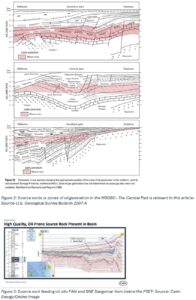

Discoveries in the Mauritania/Senegal Subbasin
In 2015, Kosmos Energy using 3D seismic data made the largest global discovery of gas in the tortue-1 field which straddles the Mauritania and Senegal maritime boundary. Located at 120km offshore in water depth of 2,850m, the prospect has a projected recoverable gas resource of 15 trillion cubic feet. Further appraisal drilling in the area discovered the Guembeul-1 and Ahmeyim-2 wells in 2016 and the whole complex is now renamed The Greater Tortue Ahmeyim-1(GTA-1). In 2018, Senegal and Mauritania signed an inter-governmental co-operation agreement on an equal split of 50/50 of resource and revenue to develop to production this cross-border gas prospect. The project was given a unique status in 2021 as the GTA ‘National project of strategic importance’. The development is led by BP as operator, Petrosen (Societes des Petroles du Senegal (the Senegal State oil corporation)) SMH (Mauritienne des Hydrocarbon) and Kosmos Energy.
The unprecedented scale of this discovery intensified exploration further offshore in the deeper edges of the MSGBC basin with BP leading its joint venture partner Kosmos Energy. Their efforts paid off massively with the discovery of the Yakaar- Teranga gas field at water depth of 8,364 in northern Senegal. With an estimated 25 trillion cubic feet of recoverable natural gas explorable to 2053, it was flagged as the world’s largest discovery in 2017. These discoveries are a lifeline to Senegal and Mauritania and if the revenue to be generated from them are managed efficiently, it will propel their economic growth for years to come.

Discoveries in the Southern Senegal/Guinea Bissau Subbasin
Guinea Bissau has recently experienced potentially transformative drilling explorations in its 11 offshore blocks within the subbasin. Newly acquired 3D seismic data has identified significant amounts of oil in the shallow reservoirs atop the salt-induced Flore Dome and Gea Dome. These structures are in a vast expanse of water in the Atlantic between latitudes 10.7◦N and 12.5◦N, known as the joint maritime zone between Senegal and Guinea Bissau.
The demarcation of these territorial waters followed a protracted disagreement between the two countries, with Senegal, aware of the natural resource potential of the area, insisting on a perpendicular delimitation of their maritime boundary. The dispute was amicably resolved with the establishment of the Agence de Gestion et de Coopération entre le Sénégal et la Guinée-Bissau (AGC). The AGC’s primary objective is to facilitate collaboration between the two countries in sharing resources to develop the oil and gas prospects in the area.
Recent developments in Guinea Bissau have revealed an underhand deal between the former President of Senegal, Mr. Sall, and his Bissau counterpart, Mr. Embalo, which has caused outrage among Bissau-Guineans concerning the prospective revenue split between the two countries at production. More details on this will follow.
Discoveries in Senegal – The Gambia subbasin – FAN-1, SNE & Sangomar Field
The discovery of the SNE-1 Sangomar field has ignited debate about its exact geographic boundary and whether it extends into The Gambia’s maritime area. These debates intensified in June 2024 when Senegal produced its first oil barrel from a well in the field, making it the newest oil-producing nation in Africa. This journey began in 1960, when the Senghor Government prioritised promoting investment in oil and gas exploration. Although Senegal’s first oil well in DiamNadio in 1960 was not commercially viable, it spurred successive governments to introduce policies attracting foreign investment. Significant reforms began under President Abdou Diouf and continued more vigorously under his successor, Abdoulie Wade. Wade succeeded in creating a stable and predictable environment for multinational investors, a policy continued by his successor, Macky Sall.
FAR Ltd, an Australian company focused on African oil and gas exploration, acquired licenses for three contiguous Senegalese blocks (Rufisque, Sangomar, and Sangomar Deep) in 2006. Incorporated in Western Australia in 1984 as First Australia Resources NL, it became FAR Ltd in 2010. These blocks cover 7,500 km² in the productive MSGBC basin, located in the Senegal/Gambia sub-basin.
The blocks contain four prospects. On the paleo shelf-edge trend running between the mouths of the Saloum and Gambia rivers, about 50 km offshore, are SNE-North-1 and SNE-1 (Sangomar Offshore). The SNE-1, renamed Sangomar Field Development Phase 1 (SNE-1 Sangomar) by President Macky Sall, is contiguous with the northern edge of The Gambia’s A2 block. The deeper water prospects are Sangomar Deep FAN-1 and FAN South-1.
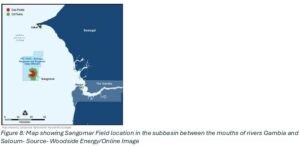
In 2013, FAR Ltd made a strategic decision to buy the licenses, previously held by Hunt Ltd, including modern 3D seismic data covering targeted 2,050 km² of the blocks. FAR Ltd enhanced the data, identifying hydrocarbon layers in the FAN-1 and SNE-1 fields and mapping four initial drillable prospects, followed by another seven. However, as a small venture capital company, FAR Ltd lacked the capital and expertise to drill offshore wells, prompting it to seek joint venture partners. FAR Ltd farmed out 85% of its license interest to Cairn Energy (operator, 40%), ConocoPhillips (35%), and Petrosen (10%).
At the time, FAR Ltd.’s Managing Director Cath Norman said:
“We are very pleased to have secured leading independent Cairn Energy as a farm in partner and Operator in our Senegal Project. With this agreement FAR has secured a highly experienced Operator to drill and fund it through the first exploration well to be drilled off the Senegalese coast for some years.
Cairn Energy funded most of the exploration costs and paid FAR Ltd.’s past costs, running into millions of dollars. The first well, FAN-1, was successful, revealing a gross oil-bearing interval of 500 meters with potential recoverable oil resources of 2.5 billion barrels. Cath Norman, FAR Ltd.’s Managing Director, highlighted the drilling risks and uncertainties about source rock capacity:
‘One of the key risks out here is that the presence of source was unknown. We know in this part of West Africa the source rocks turn on and off. And whether they exist out here to have the capacity to be filling the billion-barrel traps that we had mapped was a complete unknown to us. So, seeing a 500-meter oil interval is a great start’.
The SNE-1 Sangomar field, with a footprint of 400 km², was forecast to have a recoverable oil resource of 641 million barrels, the biggest discovery in Senegal’s history. FAR Ltd was awarded the Breakthrough Company of 2016 by the Oil and Gas Council Africa. The field also contained significant gas reserves. Cath Norman, describing the drilling team’s encounter with the field in one of her representations said:
‘Field was in fact larger. It was not until we drilled the 4th well that we stepped out of the gas cap and managed to intercept some of the secondary reservoirs in the oil leg. We are now four times the size of the field when we originally mapped it.’
Ms. Norman described the field’s geology: a carbonate platform with extensive oil reservoirs in stack formation. The deeper S500 series reservoir is in the lower Cretaceous, while the upper S400 series reservoir is in the upper Cretaceous, topped by a gas cap. Connectivity tests confirmed good inter-well connectivity in both reservoirs. Indeed, Ms. Norman touched on this when she said in a presentation:
‘Connectivity is the last piece of the puzzle we need to resolve. Our field is really a field of two primary reservoir families. There is a deep reservoir unit which we call our 500 series. It’s made up of thick and blocky sand. They are lovely and young and clean with great porosity.’
She continued:
‘The upside is that the cream on the cake is proving a lot more of the connectivity of the thin sand that sits above the 500 series. We call that our 400 series and the focus of our next two wells will be which our JV are committed drilling in Nov to flow test some of those upper sands and also running interference tests which involves setting gauges, setting up the wells to be listening wells and then drilling a pulsing well and then looking at how those pulses proliferate across the thin sand. We will get a measure of connectivity of how continuous they are across the field’.
In fact, those connectivity tests were done, and Cairn Energy confirmed in one of its Appraisal Reports in 2018 that there was good correlation of the gross reservoir packages. It reported that connectivity in the S400 upper reservoirs was demonstrated by interference tests in a clearly preferred orientation and that the DST in the S500 lower reservoir confirmed expected good inter-well connectivity.
Ms. Norman has confirmed this because in the concluding part of her presentation she said:
‘Each well we drilled in the appraisal programme confirmed that we have 100meter gross oil column across all of the wells. We have the same high quality 32-degree oil quality across all the field, and we have good correlation between all of our principal reservoir units’.
FAR Ltd.’s success in Senegal was largely due to its joint venture partners, particularly Cairn Energy, ConocoPhillips, Petrosen, and later Woodside Energy. The type of drill rig used also played a significant role. Norman noted the difference in performance between the 5th generation semi-sub vessel and the 7th generation drill ship, which reduced non-productive rig time significantly. This is what she said:
‘When we drilled our first two exploration wells, we had a fifth-generation semi subcontracted for the drilling at $650,000 a day. That is just the rig rate not the total spread. When we drilled four appraisal wells some 18 months later, we contracted a rigg for $330,000 a day. It was a seventh-generation drill ship and performed immensely better than the semi-sub we had on our first drilling mission. We are just in the process of tendering for a rig now for our drilling programme in Nov. Looks likely we will be able to secure the equivalent of a seventh-generation drill ship for under $200,000 a day. Cost of drilling has come down by two-thirds. What is actually more important to us is the efficiency of the drilling. When we drill our first appraisal well, we had 70% non-productivity rig time. Which is abysmal. We had out 10% non-rig time for the four other appraisals well we drilled. And on one of the well, we had 3% non-productivity rig time. So, our JV is moving ahead very quickly now to secure rigs for continuing with appraisal and getting on with development drilling’.
FAR Ltd.’s entire operational focus was in the SNE-1 Sangomar field and the company given its long presence in Senegal from 2006 had developed deep connections and working relations at the highest level within the government, the office of the President of Senegal who at the time was Mr Macky Sall.
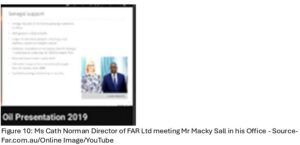
Today, there are more than twenty-three successfully drilled wells in the SNE-1 Sangomar field, and the first oil barrel was produced in June 2024. The revenue split is 82% for Woodside Energy and 18% for Petrosen. FAR Ltd.’s previous 15% stake in the field will be discussed later.

Oils and Gas Exploration in The Gambia
The Gambia’s foray into oil and gas exploration can best be described as sporadic. Between 1965, when it gained independence from Britain, and 1994, the country saw limited exploration activities. During the First Republic under Sir Dawda Jawara (1970- 1994) and the early years of the Second Republic under Yaya Jammeh, exploration efforts were scattered and intermittent. Some companies were involved in early exploration in the 1950s, but these were limited in scope and consisted mainly of initial studies. The country’s first oil well was drilled by Chevron in 1979, but it was not successful. This lethargy for oil exploration may have been shaped partly by Britain’s limited economic view of the country. During the colonial period, Britain saw The Gambia as an insignificant peanut-producing territory within its larger colonial empire. Britain showed little interest or enthusiasm for the economic development of the country beyond maintaining the lucrative supply line of raw peanuts to the UK.
Britain was circumspect about The Gambia’s viability as a state given its small size, being a narrow strip of land within Senegal with a tiny coastline on the Atlantic Ocean to the west. When the movement for independence began to gather unstoppable momentum, there were diplomatic discussions within the United Nations about whether merging with Senegal might be a better prospect for the country. However, this plan never advanced beyond discussions, and The Gambia was left to map its own path when Britain departed in 1965. The country had already been affected by British colonialism; before colonization, The Gambia was a much larger territory, with its northern border deep inside Sine Saloum near Kaolack, Senegal. British traders preferred to stay close to the banks of the River Gambia (no more than 30km wide at its broadest). As a result, Britain abandoned much of the territory to the French, who expanded further into The Gambia in 1850, reducing it to its current size.
For much of the 60s and 70s, while Senegal was busy exploring its oil and gas prospects both onshore and offshore, the government of Sir Dawda Jawara in The Gambia remained largely indifferent to the vast natural resources in and around the country. This lack of curiosity and ambition was evident when, in 1975, The Gambia agreed to its northern and southern maritime boundaries with Senegal along parallel equidistance lines running 200 meters east to west from the territorial sea baseline to the outer edge of the continental shelf. By that time, Senegal had a far better understanding of its offshore natural resources and readily agreed to the deal. The Gambia effectively shot itself in the foot, closing the door to an unimaginable National Wealth Fund from oil and gas that could have transformed the country’s socioeconomic development for generations if managed properly. A much wiser agreement would have been a perpendicular line on either side of the maritime boundary with common zones of mutual control with Senegal. All the SNE-1 Sangomar acreage would have been in this zone, rendering much of the discussion in this paper irrelevant. This approach is exactly what Senegal agreed upon with its southern neighbour, Guinea Bissau, maximizing its current oil and gas prospects in the AGC.
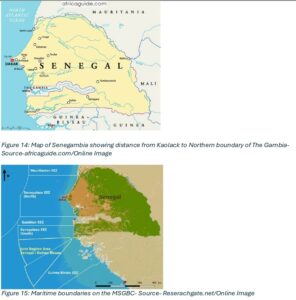
The Jammeh Era
Much of the credit for the limited progress The Gambia has made in oil and gas exploration goes to the government of Yahya Jammeh, who, for the first time in the nation’s history, established a Ministry of Petroleum in 2002. His government included policies for oil and gas exploration and development in its National Development Plan. The National Energy and Petroleum Act 2004 was passed into law, although it was largely based on legislation from Ghana.
Oil and gas exploration licences were made available for six separate blocks offshore The Gambia. Erin Energy was one of the first companies to acquire a licence for one of the blocks. However, there was a problematic period when several of the licenses were traded among insiders, with little benefit to the country. A case in point is the licenses in blocks A1 and A4 granted to African Petroleum Ltd, a company then majority-owned by Mr. Frank Timis. Mr. Timis, a Romanian-Australian billionaire, is a controversial figure in the oil and gas scene in West Africa. His activities in the subregion were negatively highlighted in a 2019 independent investigation by the Organized Crime and Corruption Reporting Project (OCCRP) and BBC Africa Eye. Although oil was reportedly discovered offshore in 2003, Mr. Jammeh publicly criticised what he considered to be an insultingly low production sharing percentage offered by the exploration companies at the time. He declared that he would rather leave the oil in the ground than agree to an unfair sharing agreement. Jammeh’s intransigent conduct in this regard betrayed his intelligence. He failed to realise the importance of opening dialogue with Senegal for joint exploration and production in Sangomar, especially at a time when Senegal had made significant progress. Unwittingly, he too failed The Gambia.
Since then, there had been limited activity in oil and gas exploration until after 2016, when Jammeh was forced to leave office following his loss in the general election to Adama Barrow. Jammeh initially refused to hand over power but eventually went into exile.
Enter FAR Ltd – The Gambia
FAR Ltd entered The Gambia during a tumultuous period in the nation’s history, marked by elevated uncertainty and disarray as a new government struggled to assert control after two decades of brutal dictatorship. Government institutions were either not fully functional or non-existent, and there was no effective regulatory environment for oil and gas exploration. FAR Ltd quickly established a subsidiary, FAR (Gambia) Ltd, and acquired the 100% interest held by Erin Energy in The Gambia’s A2 and A5 blocks. These blocks are located south of the SNE-1 Sangomar field offshore Senegal, covering 2,682 km² within the MSGBC basin, specifically the Senegal/Gambia subbasin, about 50 kilometres offshore in water depths ranging from 50 to 1,200 meters. FAR Ltd forecasted a recoverable oil resource of one billion barrels in the blocks on an unrisked best estimate of 100%.
The license deal, giving FAR Ltd 100% working interest in blocks A2 and A5, effectively meant The Gambia owned none of its oil and gas resources upon discovery. All rights to explore, drill, produce, and sell resources from the blocks belonged to FAR Ltd and other licence holders. The Gambia had imprudently hinged its hopes on royalties’ payment at production. This arrangement, despite any savings The Gambia might have made from associated expenses, was to say the least, disadvantageous. Even Senegal had the foresight to retain an 18% interest in its blocks.
The exact terms of FAR Ltd.’s original licence have never been publicly disclosed. What is known is that FAR Ltd often referred to a minimum term of drilling one exploration well a year. Details about performance-related clauses, supervision, frequency of reviews, and dispute resolution mechanisms remain unknown. These elements are crucial in properly drafted commercial agreements but are often watered down or omitted in the African context.
FAR (Gambia) Ltd operated with a small team, including an Australian Asset Manager, reportedly based in The Gambia for some time. FAR Ltd would have had a good idea of working practices in The Gambia. The team was housed in the same building as the Ministry of Petroleum. Cath Norman from FAR Ltd highlighted that this proximity facilitated better and easier cooperation with the government.
Just before FAR (Gambia) Ltd.’s contractual drilling commitments in The Gambia were due, FAR Ltd claimed financial difficulties, as it had done in Senegal. Fortunately, Petronas, a major Southeast Asian oil and gas company, agreed to farm-in, initially taking a 40% interest in the A2 and A5 block licenses, later revised to a 50% split. FAR Ltd was the operator under the licenses, despite lacking prior experience in the MSGBC basin. Petronas had the option to assume the role of operator, though the terms and conditions were never made public.
To facilitate the deal, Petronas established a subsidiary in The Gambia, PC (Gambia) Ltd. Exploration and drilling activities were purportedly channelled through these two Gambian-registered subsidiaries in whose names the licence blocks were held. Board memberships and financial details of these companies have not been publicly disclosed. Notably, the lawyer retained by FAR Ltd for its subsidiary, FAR (Gambia) Ltd, shares chambers with their mother, a domestic PEP who has represented several parastatals and the country’s largest local authority. A former Attorney General, she also has family ties to high-ranking government positions, including a brother who served as Minister of the Interior and head of the Gambia Civil Service.
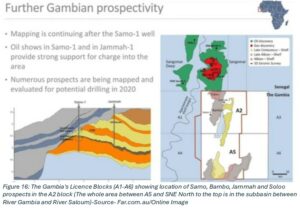
Samo-1 FAR Ltd.’s first well in The Gambia
The SAMO-1 well is located slightly off-centre within the A5 block on the PSET shelf edge trend. The reservoir sand for SAMO was deposited over 100 million years ago by ancient rivers that likely once occupied the area where the River Gambia currently flows. The SAMO-1 reservoirs were formed adjacent to where these rivers reached the coast. FAR Ltd forecasted a pre-drill estimate of 825 million barrels of recoverable oil on a 2P basis for this prospect.
In preparation for drilling, FAR Ltd claimed to have contracted a Stena DrillMax sixth-generation drillship and Exceed Ltd, a drilling management company based in Aberdeen, Scotland, to operate the drillship and drill the well. However, in a 2018 appraisal, Cairn Energy reported that no 3D seismic data was available for this prospect, suggesting that FAR Ltd relied on less accurate 2D data or none at all for its assessments. In an interview with Gavin Collery, Ms. Norman of FAR Ltd stated that 3D seismic data was available, but her remarks seemed to conflate the SAMO-1 well with the Bambo well, which is known to have undergone 3D mapping.
Lacking the necessary expertise and financial resources, FAR Ltd required Petronas to fund the project. Ms. Norman acknowledged this in a 2017 interview with Mr. Collery, stating, “It’s always best practice and prudent to bring a partner in when you have got a large equity position both to ratify your technical evaluation but also to share the cost.”
Later, in a presentation, Ms. Norman added, “FAR will continue to operate both licenses through the exploration phase, including the drilling of Samo-1, although Petronas will have the right to become the operator in the development phase.”
Despite these assertions, the actual drilling of the SAMO-1 well remains unclear. FAR Ltd was initially expected to handle the drilling, but this is complicated by a statement from FAR Ltd.’s Asset Manager, Mr. Rolf Stork, who remarked, “Petronas carried FAR drilled one well, SAMO-1. We drilled it as an operator. Big undertaking for a small company like FAR.”
Ms. Norman further clarified Petronas’ supervisory role in the joint venture, stating, “Petronas brought in as partners JV. 40% each. Petronas carried us through the drilling of the exploration well.” However, the specifics of Petronas’ involvement beyond funding remain ambiguous, with no public disclosure from Petronas or PC (Gambia) Ltd regarding their activities in The Gambia.
The SAMO-1 well, reportedly drilled to a depth of 3,200 meters into the seabed, did not yield oil. FAR Ltd claimed to have continued collecting extensive logging data to evaluate other prospects. Initially believed to be an extension of the SNE-1 Sangomar field, post-drill evaluations revealed that SAMO-1 was not connected. Mr. Peter Nicholls, FAR Ltd.’s chief geologist and exploration manager, explained, “We came in structurally a bit lower… two structures instead of one big field. There was oil in the system, but it was not able to be trapped.”
FAR Ltd suggested that the oil might have migrated to the Bambo well in the A2 block. Mr. Nicholls noted, “The interesting thing about this Bambo prospect is that if you follow the migration path, where the oil from SAMO-1 is likely to end up is overlying that feature, potentially 300 million barrels or more.”
FAR Ltd.’s objective after the failed SAMO-1 prospect was to trace the oil’s migration path to an accumulation zone. Success depended on the accuracy of structural maps, predictions of sand characteristics in accumulation zones, identified fault lines, formations, shale types, and effective drilling. With modern drilling techniques and geophysical mapping, the role of luck is reduced, yet the question remains: why and how did FAR Ltd fail The Gambia?

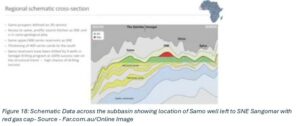
The second well – Bambo-1 (side track-1) & Soloo
In 2020, FAR Ltd moved on to its next drilling prospects, the Soloo and Bambo wells. These are located to the north of the A2 block, nearly side by side on an elevated gradient of the PSET shelf trend, part of the SNE-1 Sangomar field extending into the A2 block. The available 3D seismic data predrill confirmed the geological formation as a continuous extension of the SNE-1 Sangomar field into The Gambia. FAR Ltd.’s Exploration Manager and chief geologist Mr. Nicholls noted:
“You could see that Soloo could well be an extension of the SNE. As a matter of fact, it’s very much mapped as an extension of SNE into The Gambia, and that is Woodside and other JV Partners in SNE will see that SNE does extend into The Gambia. So that’s not a contentious issue. It’s the way it’s seen and mapped as extending into our block.”
In a predrill presentation, Ms. Norman commented on the Bambo well:
“You can see clearly that the Sangomar oil fields extend south into The Gambia. In fact, the location of the Bambo-1 well is 500 meters from the border to the south, drilling into the extension of the Sangomar field that we call the Soloo prospect.”
The predrill forecast estimated recoverable oil from the Bambo-1 well at a billion barrels. FAR Ltd planned to drill through three prospects: Soloo upper, Bambo upper, and Soloo deep, categorized as the S390, S400, and S500 series, respectively. The Soloo upper in the S390 series had the highest chance of success at 36%. The predrill seismic data indicated that all three prospects were within the same depth and level as the primary reservoirs in the SNE-1 Sangomar field.
FAR Ltd again acted as the operator, reassembled the same drill team from the failed SAMO-1 prospect, and contracted the same Stena IceMax Drill ship (not the seventh generation vessel used by Cairn Energy in the SNE-1 Sangomar field). FAR Ltd reported that the drill rig was operational offshore Mexico, and this was advantageous as it meant FAR Ltd would not be using a cold stack rig. However, there was no disclosed verifiable evidence that this rig was service worthy and fit for purpose. FAR Ltd.’s headquarters was reportedly in Banjul, The Gambia, but the operational base was in fact in Dakar, Senegal, where supply boats delivered all necessary pipes and goods for the drill vessel.
In November 2021, FAR Ltd finalised well locations and commenced drilling soon after. In December 2021, FAR Ltd reported that the wells, particularly Soloo Deep, did not contain commercially viable quantities of oil or gas.
A subsequent press release stated:
“Bambo-1 was initially drilled to a depth of 3216m MDBRT (Meters drilled below the rotary table), and wireline logging was completed. The Bambo-1 well was then plugged, and the Bambo-1 ST1 (side-track) well drilled to a depth of 3317m MDBRT, after which wireline logging was undertaken.
The drilling and logging data from the main well and the side-track well indicated that several target intervals had oil shows, confirming a prolific oil source in the area. Initial interpretation of cuttings and wireline logging suggested these zones had oil in poor-quality reservoirs and in traps that might have been breached, leaving residual oil. Rocks and fluid samples were recovered from several intervals in the Bambo well, and laboratory analysis in 2022 will provide additional data about the oil potential identified in the Bambo well.
The Soloo prospect objectives in the Bambo-1 well, which represented the potential southern extension of the Sangomar field in A2, indicated some oil shows but no significant oil volumes. However, oil shows in the Bambo prospect reservoir, encountered in both the Bambo-1 and Bambo-1 ST1 wells, highlighted up-dip potential to the south in the A2 Block, mapped as the new Panthera prospect. Other reservoirs in the Bambo drilling campaign show oil potential, opening additional exploration opportunities in both the A2 and A5 Blocks.
The well and side-track have been plugged and abandoned as planned for this type of exploration drilling.”
The press release emphasised that the Soloo and Bambo-1 prospects were not
extensions of the SNE-1 Sangomar field. It did not clearly disclose that drilling had not
gone as planned. The drill rig had an accident at 3216 meters below the seabed, forcing
FAR Ltd to halt operation before reaching the target depth of 3450 meters MDBRT. They
then planned a side-track well, Bambo-1 ST1, which also fell short of the target zone.
FAR Ltd and its JV partner Petronas designated the well a ‘tight hole’ and released
minimal information during drilling.
The cause of the accident was unclear, and FAR Ltd did not provide details. Ms. Norman, FAR Ltd.’s Managing Director, commented:
“FAR is pleased with the experienced drilling team and contractors who quickly adjusted the Bambo-1 drilling program to suit the geological setting and best meet the drilling program’s objectives. FAR is well-placed to achieve these objectives through the side-tracked well and drilling through the undrilled Soloo Deep prospect. We are encouraged by the presence of oil in potential reservoirs and look forward to completing the well in the coming weeks.”
FAR Ltd.’s drilling programme appeared unfocused, attempting to drill through three separate reservoirs in a stacked formation—a technique not tried in the successful SNE-1 Sangomar field. This ambitious approach led to challenges, including a sudden loss of fluid mid-drilling, necessitating diversion through an unplanned side-track well.
Curiously, FAR Ltd made no reference to Petronas having any role in this drilling, unlike the SAMO-1 well. Instead, the company pointed to an unidentified drilling team and contractors. Several plausible reasons for this drilling failure include the inexperience of the crew, inaccuracies in the geophysical survey data, errors in seismic data interpretation, or an ill-equipped drill rig. However, given the geophysical team’s successful track record in the SNE-1 Sangomar field, it is unlikely they were the issue. The limited information available about the drilling crew suggests that FAR Ltd.’s inexperience as an operator was the main problem. The company failed to effectively coordinate the drill crew, drill rig, and geophysical team to overcome the complex drilling challenges.
FAR Ltd.’s finding of no commercially viable oil and gas in the Bambo-1 and Soloo wells contradicts the predrill 3D seismic data showing these wells as connected to the successful SNE-1 Sangomar field reservoirs. Ms. Norman stated predrill:
“The outcome of that process is that we have a net billion barrels of oil potential in our two blocks offshore Gambia. Following the risk audit of FAR’s evaluation of the potentials, we have confirmed a P50 un-risked 1.1 billion barrels of potential in The Gambia. We have always expected our acreage to be highly prospective because it is contiguous with our acreage in Senegal. We have drilled 11 wells offshore Senegal, 8 on the same trend that extends into The Gambia, and 8 into the same reservoirs that will be our primary reservoirs in The Gambia.”
(Emphasis underlined by author)
The 3D seismic data indicated that all the successful wells in Senegal’s SNE-1 Sangomar field were in the same primary reservoirs (S400 and S500 series) as the wells in The Gambia. The Gambian prospects were charged with oil, as proven by Cairn Energy and admitted by FAR Ltd, confirming that all wells in the S400 and S500 reservoir series are connected.
This raises the question: what separates the Soloo and Bambo-1 prospects from the SNE-1 Sangomar field? Is there a risk that FAR Ltd.’s finding—that its SNE-1 Sangomar field does not extend into The Gambia’s A2 block—is based on its failed drilling programme?
The Bambo and Soloo prospects have multiple reservoir targets, with two main reservoirs in the S400 series being hydrocarbon-bearing in the SNE-1 Sangomar wells. FAR Ltd has not identified at least to the public in the Gambia which reservoirs in the Bambo and Soloo prospects do not contain commercially viable oil or which targets may have been missed due to drilling failure.
A troubling coincidence is that the prolific SNE-1 Sangomar S400 and S500 series reservoirs suddenly do not contain commercially viable oil at the boundary line where the field extends into The Gambia. FAR Ltd claimed that the reservoir for the Bambo-1 well was poor and unable to trap oil due to seal breaches, the same reason given for the failed SAMO-1 well.
The geophysical features of the PSET shelf edge in the SNE-1 Sangomar field and the A2 and A5 blocks are nearly identical, formed over the same period and close in time and space. The reservoirs in the A2 and A5 blocks are good, but the seals, made of black/grey shales, are reportedly underdeveloped according to Far Ltd. If true, this suggests that the oil in The Gambian prospects has migrated into an unidentified accumulation zone.
FAR Ltd does not dispute this, but it raises the question: does FAR Ltd have a duty to consider and determine the phenomenon of oil migration from The Gambia?
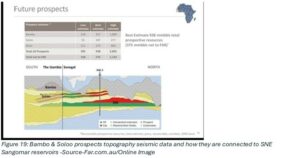
The Source Kitchen & the phenomenon of oil migration in the MSGBC – Senegal/Gambia subbasin
The hydrocarbon source ‘kitchen’ that feeds all the reservoirs in the SNE-1 Sangomar field lies deep below the seafloor of the basin, migrating up the slopes of the PSET trend in a westerly direction into the reservoirs.
The Soloo and Bambo prospects have easy access to this source kitchen, similar to other reservoirs in the SNE-1 Sangomar field. FAR Ltd.’s Ms Norman underscored this point in one of its presentations:
“I would like to walk you through what the exploration opportunity looks like for FAR. Starting with the Sangomar oil field, which is a known oil field sitting on the shelf edge of a carbonate platform being fed by oil generated in the source kitchen deep out to the west. You can see on the bottom left of the seismic line that I’m showing you is right through the Sangomar oil field, and I’m going to step through to the south to show you the prospects further to the south in the Gambia. The first, of course, are Soloo and Bambo that we’ll be drilling with the Bambo 1 well just to the north of our blocks in A2. You can see that they have easy access to the source kitchen and that source kitchen is very prolific to generate enough oil to house 5 billion barrels of oil just in place just to the north in Sangomar, which means we have a really rich source rock that’s capable of generating a lot of oil in this region. As we step further to the south, we have the Jobo prospect at about 280 million barrels, the Jato prospect at about 130 million barrels, and then Malo, a very large prospect out to the east at about 265 million barrels. All on a P50 best estimate basis. So, lots of follow-ups in our A2 and A5 blocks. We are not just about drilling Bambo this year.” [Emphasis underlined by author]
The migration path of oil into an accumulation zone or reservoir is directed by hydrostatic pressure exerted by gravity on the source kitchen. Often, the migration path follows natural fault lines within hydrocarbon formations. When these fault lines remain active and overlap with a trap, the trap becomes the main accumulation zone. The oil remains trapped in the accumulation zone if the reservoir is made of good porous sandstone or limestone and has mature seals to prevent further migration or degradation by water.
Apart from gravitational pressure, other key factors determining the migration path of oil into an accumulation zone or reservoir include buoyancy, the geothermal gradient of the hydrocarbon formation, the size of the fault lines, and the porosity and permeability of the reservoir sandstone. Primary migration and accumulation of oil may have started millions of years ago but can continue as long as the source kitchen releases oil and the fault lines are active, allowing secondary migration into other reservoirs.
The viscosity of the oil in the SNE-1 Sangomar field, at 32◦, makes it a light fluid, similar to the residual oil in The Gambian prospects. Therefore, it would migrate at a much faster velocity over long distances under normal geothermal conditions. Since The Gambia’s A2 block is physically contiguous with the SNE-1 Sangomar field, as shown by 3D seismic data, the migration of a large volume of oil from there into the SNE-1 Sangomar field would be quick and effortless.
The SNE-1 Sangomar field is at the centre of a geographic phenomenon in the Senegal/Gambia sub-basin, part of the MSGBC basin. It contains giant reservoirs or accumulation zones into which oil is fed from the source kitchen. It also serves as the most likely trap zone for oil migrating along the PSET shelf from different directions, particularly from The Gambia.
The acreage of the SNE-1 Sangomar field is unusually extensive. It sits on a depression on the PSET and has a lower gradient compared to the Soloo, Bambo, and SAMO-1 prospects in The Gambia. It supports two known separate gigantic oil reservoirs in stacked formation, the lower and upper reservoirs, with a substantial gas cap. These reservoirs are in lateral formation, separated by thick layers of ancient rock. The secondary migration paths into these reservoirs are confirmed to be through separate stratigraphic fault lines from the source kitchen in a west-to-east direction.
Basin modelling from FAR Ltd.’s exploration in the A2 and A5 blocks identified a secondary migration path running the length of the PSET from south to north, from SAMO-1 towards Bambo-1. The SNE-1 Sangomar field lies north on this migration path. If the oil in the SAMO-1 well could not be trapped due to a lack of mature seals (though it has a good reservoir) and its migration path is charted towards the Bambo and Soloo prospects as FAR Ltd has acknowledged, then those two are not the accumulation zones, as they are reported not to have oil in commercially viable quantities.
The oil must have migrated further into an alternative trap, and the most probable location of that trap, in terms of time, distance, and space, is the extensive SNE-1 Sangomar reservoirs.
The substantial gas cap on the SNE-1 Sangomar field is further evidence of the secondary migration of an enormous volume of oil into these reservoirs, particularly the S400 series. The gas cap resulted from thermal regeneration, where increased temperatures in the hydrocarbon formation caused chemical reactions that converted oil into gas. What remains in the reservoir is the current volume of oil that has not been heated into gas.
Oil reservoirs maintain equilibrium through hydrostatic pressure. When this pressure is disrupted at any point, the fluid will naturally flow toward areas of lower pressure. The giant S400 and S500 series reservoirs in the SNE-1 Sangomar field have had 23 wells drilled in them, and there could be even more. Numerous pressure tests conducted by FAR Ltd, and its JV partners confirmed the connectivity of the wells in those reservoirs. Therefore, the historic pressure within the reservoirs was disturbed well before it was determined whether the SNE-1 Sangomar field extended into The Gambia.
For obvious reasons, FAR Ltd. seems to focus its efforts on identifying a separate accumulation zone (however unlikely) for the prospects in The Gambia. Despite these efforts, the company has made little progress in pinpointing a distinct migration path and accumulation zone for the billion barrels of oil it once predicted in its Gambian blocks. It has been seven years since the drilling of the SAMO-1 well and three years since the drilling of Soloo and Bambo-1, along with the Bambo-1 sidetrack-1. Yet, FAR Ltd. has not provided any substantial updates on the extensive research it claims to be conducting on the logging data from these unsuccessful wells. Instead, the company is now shifting its focus to the Panthera, Jato, and Malo prospects within the A2 block, which are located in the same area and gradient as the Bambo well, in close proximity to the SNE-1 Sangomar field.
The question must be asked: Is it necessary for there to be a separate oil accumulation zone in The Gambia if geophysical analysis confirms that oil migrates or migrated from the Gambian prospects into the SNE-1 Sangomar field or across the maritime boundary into Senegal? If this is the case, what potential difficulties would FAR Ltd have encountered in navigating the contractual and political challenges that might have arisen, given that, before selling its stake in 2020, it partly owned the SNE-1 Sangomar field?
Specifically, this points to several issues:
- FAR Ltd.’s contractual relations with its joint venture partners in the SNE-1 Sangomar field.
- Its contractual relations with the Gambian government regarding the A2 and A5 blocks. This points to FAR Ltd.’s obligation under specific clauses dealing with development and production of the oil and the payment of royalties to The Gambia.
- The potential contentious issue of shared stakes between The Gambia and Senegal.
How might these factors have impacted the oil production revenue-sharing agreement and the production schedule of the joint venture partners in the SNE-1 Sangomar field if The Gambia were to assert its right to a share of the oil and gas? Woodside Energy and Senegal would clearly want to avoid any delays in their production schedule from the SNE-1 Sangomar field. It seems FAR Ltd was caught between a rock and a hard place!

The Law – Conflict – Natural Resources along/near to Maritime boundaries
Both The Gambia and Senegal are signatories to the United Nations International Convention on the Law of the Sea (UNCLOS). The convention does not specify how states should share or exploit natural resources between their maritime boundaries, nor does it address the migration of natural resources, such as oil, from one country into an accumulation zone across maritime boundaries. It encourages nation-states to adopt principles of equitable dealing, good faith negotiations, and respect for sovereignty in bilateral and multilateral agreements. These concepts often carry legal nuances that are challenging for courts and judges to apply consistently.
Natural resources below the seabed between countries are of strategic importance and require active cooperation between states to harness their value. However, the absence of international law detailing how ownership rights over these resources should be determined has led to “safari justice” in some parts of the world, where might prevails and weaker countries struggle to protect their interests. Another aspect of this issue is related to the jurisdiction of maritime boundaries. It is commonly assumed that strict adherence to surface maritime boundaries automatically determines ownership rights of resources deep below the seabed, which can lead to significant injustice. Oil and gas, for instance, are migratory substances that can cross maritime boundaries due to gravitational pressure differences. The Senegal/Gambia sub-basin of the MSGBC is exclusively shared by the two countries, and equitable principles suggest that its sub-seabed resources particularly in the area between The Gambia and Saloum rivers should be jointly shared. This should not be contingent on proving oil migration from Gambian wells to the SNE-1 Sangomar field. The aggressive stance of the Macky Sall government and the oil companies in the SNE Sangomar exemplifies the excesses of unchecked capitalism. At a deeper level, it also questions Sall’s moral value as a Senegambian.
The same principles of equitable dealing and good faith negotiations apply in private international investment agreements. Investors must perform their license obligations in good faith, which has both substantive and procedural perspectives. Substantively, it involves the host state’s obligations to the investor and vice versa. Procedurally, it refers to arbitration proceedings for dispute resolution. Good faith encompasses fairness, honesty, loyalty, and transparency, essential for maintaining justice in international investment law. It requires parties to comply with their obligations competently and with mutual trust and cooperation.
When there is a perceived conflict of interest or lack of transparency or competence in the performance of a license obligation by an investor, the state’s interests are vulnerable. Aside from FAR Ltd.’s failure to find a separate oil and gas accumulation zone in its Gambian blocks, was it within its competence to determine for the Gambian government whether the missing oil from the failed wells may have migrated into the SNE-1 Sangomar field? FAR Ltd had already charted the likely migration path of oil from SAMO-1 well to Bambo-1 well. Why stop there? If the hypothesis is valid that oil migrated from the Gambian prospects into the SNE-1 Sangomar reservoirs, how does that reflect on FAR Ltd.’s performance if the Gambian government lacks clarity on this issue? It is the responsibility of the Attorney-General (with assistance from external counsel if necessary) to advise the government on whether the investor has performed its obligations competently and in good faith.
This task is easier with the active participation of the government through a relevant regulatory authority, as demonstrated by Petrosen in Senegal during the development of their prospects. In contrast, the government of The Gambia was unable to take similar action. It had both hands tied behind its back, having given away 100% of its interest in both blocks. Unfortunately, the government could not rely on its Attorney General, Ministry of Petroleum, GNPC, or Petroleum Commission to intervene, for reasons apparent to most Gambians. Independent legal and geotechnical advice was urgently needed. Furthermore, the involvement of FAR (Gambia) Ltd.’s lawyer creates a potential significant conflict of interest, even in the absence of any clear indication of wrongdoing.
The Political Agenda – Senegambia
The legal framework for oil and gas exploration in The Gambia is complex, and the political landscape further complicates matters. FAR Ltd.’s performance in The Gambia’s A2 and A5 blocks has not improved the situation. FAR Ltd has effectively put a nail in The Gambia’s oil and gas exploration prospects by finding that the SNE-1 Sangomar field does not extend into The Gambia without fully addressing the potential migration of oil from The Gambia into the SNE-1 Sangomar field. This outcome benefits Senegal, where former President Macky Sall negotiated an extremely poor production sharing agreement, allowing Woodside Energy to retain 82% of the revenue while Petrosen, Senegal’s state oil corporation, received only 18%. Mr. Sall would likely have preferred to avoid any reduction in Senegal’s share, and FAR Ltd.’s findings reinforced this by negating The Gambia’s claim to exploration and production rights, unlike in Mauritania to the north and Guinea-Bissau to the south.


Senegal, under Macky Sall, adopted a silent but sophisticated policy of economically merging The Gambia with Senegal (a feat that could not be achieved politically during the Senegambia Confederation) by supporting a new regime in The Gambia that aligned with Senegal’s strategic interests. In 2016, this opportunity arose when former Gambian dictator Yahya Jammeh reneged on his promise to hand over power after losing the general election. Adama Barrow, the declared winner, fled to Senegal, and Macky Sall spearheaded diplomatic efforts in West Africa and the EU to force Jammeh out. He succeeded, and Jammeh fled into exile to Equatorial Guinea. Barrow was sworn in as President of The Gambia in Dakar, Senegal, and was escorted into the country by Senegalese security personnel. Since 2016, Barrow’s close protection officers and guards at the State House have been Senegalese soldiers and security agents. Barrow regards Sall as an elder brother, advisor, guardian, and protector against coups. The relationship between the two is more accurately described as subservient—anything Macky wanted for Senegal from The Gambia, Macky got. Their relationship, shaped by their differing levels of sophistication and experience in state affairs, appears to reflect an exercise of undue influence. One is a geologist with extensive senior government experience, while the other, despite being a successful estate agent and skilled money manager, is a high school dropout with no prior government experience. Many of Barrow’s government’s decisions since 2016 have effectively surrendered The Gambia’s economic sovereignty and security to Senegal—a gift that eluded Senegal since the two nations were divided by colonial history.
It is unsurprising that Barrow and his government have not made a single pronouncement regarding the country’s oil and gas prospects within its maritime boundary with Senegal. Even if he wanted to, achieving success would be difficult. Sall was notoriously corrupt and engaged in underhand deals. In 2021, Guinea Bissau’s president, Umaro Sissoko Embalo, signed a secret oil and gas sharing agreement with Sall, without informing his cabinet or parliament. The deal, unfavourable to Guinea Bissau, allocated only about 30% of revenue to the country. Armando Lona, editor-in-chief of O Democrata, criticized the agreement as illegal since it lacked parliamentary approval and accused the president of secrecy regarding national resources. The Guinea Bissau parliament revoked the agreement, and Sall sacked his energy minister, Amadou Hott, who did not dispute the agreement when challenged in a media interview.
Given Sall’s history, it is plausible that he has managed to silence Barrow and his government regarding oil and gas matters near their maritime borders. The opposition, parliament, and civil society in The Gambia have been silent on the subject, reflecting a lack of curiosity and ambition to safeguard national interests, reminiscent of the Jawara government during the First Republic.
There is a sense in The Gambia that discussing joint exploration, production, and revenue sharing of natural resources with Senegal is taboo, especially now that Senegal has started oil production. The commonly cited phrase, “The Gambia and Senegal are two heads of the same body,” discourages open discussion on the topic. Consequently, the government of The Gambia has failed, unlike Mauritania and Guinea Bissau, to foster intergovernmental dialogue about shared natural resources across maritime boundaries with Senegal.
As a result, Senegal is the sole beneficiary of a vast oil and gas field in the shared Senegal/Gambia sub-basin. Under normal circumstances, applying principles of equity, these resources should be shared, regardless of the discovered accumulation zone being on the Senegalese side. The Gambia’s failure to protect its share of the resources can be attributed to its weak institutions at every level. Since 2021, Mr. Jerreh Barrow has served as the sole Commissioner of The Gambia Petroleum Commission. The Commission is the authority responsible for overseeing resource exploitation, including monitoring and ensuring compliance with national policies and regulations for petroleum activities. A concerning clause in the model Production Sharing Agreement (PEPLA) stipulates a Signature Bonus to be determined by the Licensee at the time of bidding, in addition to a further $2 million payment required upon the Commissioner’s approval of the first Development and Production Plan. This payment structure also applies to any subsequent amendments or new development plans. Additionally, production bonuses of $10 million are to be paid at various stages of development. The clause links the payment of substantial bonuses to the Commissioner’s approval, which could raise concerns about potential conflicts of interest or corruption. A more robust anti-corruption measure might involve requiring approval from a board or committee rather than an individual, thereby enhancing transparency and accountability.
The Gambia National Petroleum Corporation (GNPC), responsible for encouraging petroleum operations, has abandoned initiatives to cooperate with oil and gas exploration companies as JV partners, unlike Petrosen in Senegal. The GNPC has been mired in corruption, limiting its activities to storage and distribution of petroleum products. A recent government task force, led by the Minister of Finance, found that despite having expensive computers and software, GNPC staff preferred manual entries, making record-keeping and transaction tracing difficult. Reports indicate that over $20 million has been misappropriated at the GNPC, which is just the tip of the iceberg.

BP (British Petroleum) exits The Gambia’s – A1 Block
It is therefore not surprising that BP exited The Gambia in August 2021 by surrendering its license in the A1 block. This block, along with the A4, had a chequered history. In 2006, African Petroleum acquired a 100% working interest in these blocks from Buried Hill Ltd. The licences were extended thrice, as it appeared the company was unable to fulfil its drilling obligations. When negotiations to extend the license failed, the government of The Gambia terminated the licenses for the blocks in 2017.
African Petroleum denied the termination, asserting that the government had not enacted the proper termination procedure and that its licenses remained in force until this was done. This led to an expensive and protracted arbitration proceeding lodged by African Petroleum at the International Centre for the Settlement of Investment Disputes (ICSID) against The Gambia.
While proceedings were ongoing, the government of The Gambia, in an unprecedented act of disregard for the arbitration process, opened bidding on the A1 block and sold it to BP in April 2019 before the matter was concluded. The case was eventually settled with The Gambia surrendering the A4 block back to African Petroleum in September 2020. There has never been a public disclosure of the full details of the settlement and the legal costs incurred by The Gambia in the case.
It was partly through this case that certain individuals in The Gambia who prioritise personal gain over national development opened a secret passage (disguised under the name of the Tony Blair Institute) between Tony Blair, former UK Prime Minister, and the office of the President of The Gambia. On April 18, 2018, Mr. Blair hosted President Barrow at a discussion panel held at the famous Chatham House, Royal Institute of International Affairs. Mr. Blair is known within closed circles in The Gambia to have quietly jetted in and out of the country during the period leading to BP’s exit from The Gambia. What most Gambians do not know is that behind many seemingly charitable foundations operating in The Gambia are consulting businesses for profit. Cherie Blair KC heads Omnia Strategy, an advisory firm that has picked up a phenomenal workload in the short time it has been operating, largely from developing countries.

BP’s exit from the A1 block rendered the minor result in the arbitration case a Pyrrhic victory. At the time, the Gambia Ministry of Petroleum issued a press release indicating that BP had informed the government its decision to exit was due to a change in its corporate strategy towards low carbon energy. While this might be true, BP itself did not comment on the issue. The circumstances surrounding BP’s exit from The Gambia raise serious questions about the true underlying reasons for its decision.
BP had already acquired 2D and 3D seismic data for the block and completed an environmental impact assessment at substantial cost. It had modelled two prospects in its block located very near the SNE-1 Sangomar field. The Eland prospect had a resource estimate of 936 million barrels of oil (MBO) in-place and 344 MBO recoverable with a total risk of 24%. The Oribi prospect had a resource estimate of 1,180 MBO in-place and 350 MBO recoverable with a total risk of 10%. All that remained was to drill a well, yet BP chose to pay the Gambian government a settlement of $30 million to walk away.
It would be interesting to know the composition of the negotiation team, including the legal personnel on both sides, for this settlement. It remains unclear what factors determined the $30 million settlement and how it was utilised by the Gambian government, as no public disclosure has been made.
BP is a giant in oil and gas exploration around the world, possessing the requisite expertise in exploration and production. It also has a strong due diligence unit that is highly sensitive to corrupt practices in the industry. This sensitivity reflects the UK government’s recently amended legislation on Bribery and Corruption, which covers the activities of UK-listed companies wherever they occur in the world.
BP’s decision to abandon The Gambia came in the aftermath of FAR Ltd.’s failed drilling of the SAMO-1 well, which is adjacent to and on the same trend as BP’s former A1 block. When FAR Ltd drilled SAMO-1, it reported finding no oil accumulation zone but did find traces of oil that may have migrated. FAR Ltd further indicated that the oil migration path from the SAMO well charts towards the Bambo and Soloo wells, which were mapped to be in the same two primary reservoirs as the eight others, and now twenty-three, wells that FAR Ltd and its joint venture partner Woodside Energy have drilled in the SNE-1 Sangomar field. The Bambo and Soloo prospects are even closer to BP’s previously held A1 block than the SAMO-1 prospect.
If BP had any concerns, it did not share them publicly. However, there is no doubt that its decision must have been based on extraordinarily strong reasons that were not in its interest as an investor.

FAR Ltd Laughing all the way to the bank
– Far sold stake in SNE-1 Sangomar
– Full detail of deals.
– Petronas sold back shares to FAR and left JV.
– FAR license exemption in The Gambia
It appears FAR Ltd. has emerged as the winner in the murky affairs surrounding The Gambia’s missing oil and gas. In June 2020, FAR Ltd. was in a dire financial state, having defaulted on its development cash call for the SNE-1 Sangomar field, putting its entire 13% stake in the joint venture at risk. The default clause read:
“Under the JOA default provisions, if a defaulting party has not fulfilled its financial obligations within six months from the date of notification of the default, it will forfeit its participating interest without compensation. Unpaid amounts accrue interest at the LIBOR rate + 2%.”
FAR Ltd. embarked on cost-cutting measures, including making several staff redundant and requiring all senior executives and non-executive directors to accept a 20% salary or fee reduction effective 1 July 2020.
In this abysmal financial context, FAR Ltd. embarked on its now-failed Bambo-1 well and side-track well, which it claimed were not extensions of the SNE-1 Sangomar field. Throughout the pre-drilling preparation, FAR Ltd. was in talks with Woodside Energy, which had issued the default notice and to whom FAR would have had to forfeit its stake if it did not pay up. At that time, Woodside Energy held about 69% of the stake in the SNE-1 Sangomar field.
In July 2021, three months before drilling the Bambo-1 well, FAR Ltd. was forced to sell its entire interest in the Senegal RSSD Project to Woodside Energy to avoid forfeiture without compensation. The transaction was approved at a general meeting of its shareholders on 28 April 2021. FAR Ltd. received a cash payment of US$126 million from Woodside Energy on 7 July 2021. Additionally, FAR Ltd. stands to receive future payments leveraged on the total volume of oil produced from the SNE-1 Sangomar field until 2027.
According to a notice FAR Ltd. issued to its shareholders on 12 June 2024:
“The contingent payment of up to US$55 million is payable in the future based on
various factors relating to the sale of oil from the RSSD Project.
The contingent payment comprises 45% of entitlement barrels (being the share of oil
relating to FAR’s 13.67% RSSD Project exploitation area interest) sold over the previous
calendar year multiplied by the excess (if any) of the crude oil price per barrel (capped
at US$70) and US$58.
The contingent payment terminates on the earliest of 31 December 2027, three years
from the first oil being sold (excluding any periods of zero production), and a total
contingent payment of US$55 million being reached.”
This deal raises very serious and disturbing questions:
- FAR Ltd.’s entire stake in the SNE-1 Sangomar was 15%. This has been revised down to 13% but there is no disclosure of what happens to remaining 2%.
- Was this deal disclosed pre-drilling of the Bambo-1 well to the Gambian public and the government of The Gambia?
- Given FAR’s stakes in the SNE-1 Sangomar field and in The Gambia’s A2 and A5 blocks through its subsidiary FAR (Gambia) Ltd., and its role as the operator during drilling in the Gambian prospects, what measures, if any, were put in place to protect The Gambia against potential conflicts of interest from FAR Ltd especially in the context of question 4 below on migration of oil? PC Gambia (Petronas) could not properly perform this role as FAR Ltd.’s joint venture partner in The Gambia?
- Even if the primary reservoirs in the SNE-1 Sangomar have not extended into The Gambia, does this transaction meet the transparency expected in international investment agreements in oil and gas if oil migrates or has migrated from The Gambia into the SNE-1 Sangomar field?
- What due diligence did Woodside Energy and Petrosen carry out to validate FAR Ltd.’s finding that the SNE-1 Sangomar did not extend into The Gambia’s A2 block and to rule out any possibility of oil migrating from the underdeveloped reservoirs in the Gambian prospects into the SNE-1 Sangomar field?
In August 2022, FAR Ltd. reacquired 100% ownership of blocks A2 and A5 when PC (Gambia) Ltd., the subsidiary of Petronas that previously held the other 50% stake in the blocks, conveniently returned them to FAR Ltd. It is difficult to see the business case for Petronas’s involvement in The Gambia’s A2 and A5 blocks and the justification it provided to its shareholders for taking such an enormous loss willingly.
In the meantime, FAR Ltd. has renegotiated a two-year extension to its exploration licence with the government of The Gambia, exempting it from the yearly commitment to drill a well and all other consequential taxes, fees, and expenses payable to the government.
FAR Ltd. reported that this would enable the company to consider options for delivering value while minimising its expenditure over the two-year extension period. The company aims to capitalise on the exploration data acquired from the two unsuccessful wells already drilled, without significantly drawing down existing capital.
This negotiation with the government of The Gambia would have been heavily influenced by legal advice from members of the same family or connected individuals acting on behalf of both the government and FAR Ltd. It is difficult to justify exempting FAR Ltd. from its contracted drilling obligations and all taxes and expenses payment to the government of The Gambia for the next two years, especially after having received US$127 million plus potential future millions.
There is no official gazette or publication indicating that parliamentary assent has been granted to exempt FAR Ltd. from its tax liabilities to the government of The Gambia. It would be a surprise if there had been. The government of The Gambian remains cash strapped and unable to meet basic needs for hospitals, schools, police, and infrastructure. With this arrangement, FAR Ltd. is arguably recouping every penny it claimed to have spent in The Gambia through its subsidiary under its so-called corporate social responsibility.

In the meantime, FAR Ltd. has outlined its plan for prospects Panthera, Jatto, and Malo in its A2 block, each of which it claims (as it did with the other unsuccessful prospects) contain multiple potential oil-bearing reservoir targets. However, any exploration on these prospects is conditional on FAR Ltd. finding a suitable joint venture partner to fund the cost. Thus, the extension granted to FAR Ltd. is likely to be longer if it cannot find a joint venture partner with deep pockets and one should add relevant expertise. This situation places The Gambia in a precarious position.
Given that the Gambian wells were found not to contain significant oil and gas reserves, it could be argued that FAR Ltd. strategically avoided the costs and risks associated with further exploration and development. However, this outcome also meant it evaded the possibility of discovering and developing untapped resources, which would have required them to pay royalties to the government of The Gambia. The real issue lies in the decision of the government of The Gambia to sign away 100% working interest in its exploration blocks without thoroughly exhausting all possibilities. This decision leaves The Gambia with nothing to show for its potential resources—a short-sighted move that is difficult to justify.
FAR Ltd. would likely point to the extensive cautionary exemption statement in its presentations, which it would claim absolves it of any liability for inaccuracies in its geophysical data.
Senegal/Gambia Relations
On 24 March 2024, Senegal elected a new president, Mr. Bassirou Diomaye Faye, after Macky Sall was forced by popular pressure to step down at the end of his final term. The new government, with Prime Minister Ousman Sonko at the helm, has vowed to follow and apply principles of honesty in governance. In his inaugural visit to The Gambia, the first since his election, President Faye extended an open arm of cooperation, solidarity, and respect to the government of The Gambia. This reflects his new foreign policy, which places a bold emphasis on unity and solidarity within Africa. He emphasised that the bond between the two countries will be strengthened and that nothing will change from what has already been established. It is hoped that this new government will reflect the level of honesty in governance it has spoken about in its actions, bringing transparency to all matters relating to dialogue, exploration, and production of the shared natural resources between the two countries. However, a recent high-level intergovernmental meeting between the two countries, attended by President Faye, Prime Minister Sonko, and The Gambian Vice President Jallow, focused on key areas of strategic importance but notably omitted the most sensitive topic: oil and gas. This omission raises concerns about future developments.
The curse of oil and gas in African Countries
Oil and gas have been a curse for almost all producing Sub-Saharan African countries. These nations are endowed with vast natural resources that could have propelled them into the league of developed countries. However, they have failed due to sheer mismanagement and chronic corruption. This is what sets them apart from successfully managed countries like Norway, Qatar, and the UAE, which have similar vast resources. Senegal could turn a new and refreshing chapter in resource management in Africa by emulating the successes of Norway—eliminating corruption, strengthening efficient institutions, and setting up a responsibly managed Sovereign Wealth Fund. It will need to act quickly to register any success because the era of oil and gas is rapidly ending as the world transitions to renewable energy. For The Gambia, the curse has struck even before oil and gas are discovered!
Conclusion
The results from FAR Ltd.’s exploration drilling in the SAMO-1, Bambo-1, and Soloo Deep prospects have confirmed the presence of oil. In the cases of SAMO-1 and BAMBO-1, although the reservoirs were of excellent quality, they were unable to trap the oil due to underdeveloped seals. The oil in these prospects likely migrated to an accumulation zone, which remains unidentified. The most likely location of this accumulation zone is in the SNE-1 Sangomar field. However, FAR Ltd.’s inability to identify the accumulation zone or confirm the migration path of the oil leading to speculation about oil migrating to the SNE-1 Sangomar field is due to several factors: its lack of technical expertise and funds, approach to exploration, drilling, and the accuracy of its geophysical survey data.
This failure is not FAR Ltd.’s alone. The government of The Gambia’s policy on oil and gas exploration has also failed at the level of execution. There is a serious lack of transparency in the relationship between Gambians, the government of The Gambia and FAR Ltd. This relationship appears to operate beyond confidentiality and into the realm of secrecy. Given the country’s weak institutions and the lack of proper regulatory oversight on oil and gas exploration, a vacuum is created where important decisions on matters of national interest are made by connected individuals behind closed doors. The national interest is put at risk when the performance of relevant stakeholders cannot be measured or when failures are not sanctioned.
With Senegal progressing at speed with oil production, there is an urgency for the government of The Gambia to expedite its oil and gas exploration with vigour. The exploration should be competently executed to achieve the purpose of finding an accumulation zone in The Gambia or at the very least establish the migration path of the oil from The Gambia to an established accumulation zone across the maritime boundary with Senegal, anywhere within the subbasin. The resources deep under the seabed in the Senegal/Gambia subbasin, in particular the SNE-1 Sangomar field should not be claimed by Senegal alone. It is overly simplistic to rely solely on surface maritime boundaries as the criterion for determining whether a country should share the natural resources below the seabed with its immediate neighbour. Similarly, it should not be necessary to provide evidence of oil and gas migration from The Gambia to the SNE-1 Sangomar field to justify such sharing. The government of The Gambia should initiate proactive inter-governmental dialogue with Senegal for greater clarity and understanding of the hydrocarbon and geophysical formation across their maritime boundaries. They must agree a protocol for joint resource and revenue sharing on exploration and production of oil and gas in the Senegal/Gambia subbasin of the MSGBC.
Successive governments since independence have failed The Gambia on all the indices of development. It is the smallest country in mainland Africa and potentially by far the easiest to develop if it had the right leadership and progressive orientated people. But despite its manageable size and potential natural resources, The Gambia has suffered the misfortune of having extremely poor leadership and an unenterprising population. The wealthy and so-called intellectuals and professionals have become the biggest enablers of the forces both internally and externally that undermine the economic and political sovereignty of the nation. All of these, give weight to previously held reservations that The Gambia cannot be a viable state. The saga of the exploration of oil and gas on The Gambia’s maritime coast and many other recent developments in the nation’s history should open frank discussion by the people about the future of the country. The Gambia is on the cusp of becoming a failed state (if not already) and there is not a flicker of light shining through this long dark tunnel that it has any chance left to its own accord to save itself. Developing a country requires a collective national effort. If this cannot be achieved, an appealing alternative for The Gambia, given Senegal’s new and dynamic leadership committed to justice, might be to consider full integration with Senegal. This would, in a way, correct the injustice of the Berlin Conference, where the two brotherly nations were divided without their consent. But Senegal, wary of its ‘tainted’ oil and gas lottery win, might shut the door on The Gambia. In that case, The Gambia risks drifting into the wilderness and becoming a basket case – an unsettling prospect. The only way to avoid this fate is for The Gambia to build strong institutions and demand its fair share of the resources in the Senegal-Gambia sub-basin. The Gambia must be resolute in this pursuit. For The Gambia, for Justice, for Development!
Reference Material
- Assessment of the Undiscovered Oil and Gas of the Senegal Province, Mauritania,
Senegal, The Gambia, and Guinea-Bissau, Northwest Africa
By Michael E. Brownfield and Ronald R. Charpentier - The SNE Discovery Offshore Senegal – Moving a Frontier Basin to Emergent
Eric Hathon, Exploration Director, Cairn Energy PLC 12th June 2018 - Lithostratigraphy and Characterisation of Paleocene Limestones for Optimal
Exploitation (Senegal, West Africa): Comparative Study of the Bandia and Popenguine
Quarries by Thiam, Dione, Dieye & Diakher - THE REPUBLIC OF THE GAMBIA PETROLEUM (EXPLORATION, DEVELOPMENT &
PRODUCTION) BLOCK A5 - FAR Ltd Press Release FAR Ltd Website 12/06/2024
- FAR Ltd Press Release 26 August 2022 – FAR takes 100% ownership in The Gambia
Blocks A2 and A5 - Addleshaw Goddard November 2021 – Legal Review: Oil and Gas Exploration and
Production in the Gambia. - FAR Ltd Presentation – Drilling Results from Nov 2021 – Press Release Titled the Gambia
– Highly Prospective – Seeking farm-out - FAR Ltd Presentation – Far Ltd Presentation 09/09/ 2021
- FAR Ltd – Presentation – Far Ltd AGM 2018 Presentation – Samo1 & Samo1 Pre-drill
forecast – FAR Ltd – 31.10.2018 - FAR Ltd – Cath Norman in November 2017 uploaded on – 22.03.2018 YouTube Interview
by Gavin Collery - FAR Ltd Presentation – Far Ltd – Drilling in Senegal – Sangomar RIU Good Oil
Conference 14 September 2016 Cath Norman. - FAR Ltd Presentation Relations with Petronas – 26 Feb 2018
OE 25 June 2020 FAR signs Gambia JOAs with Petronas. Seeks drilling partners. - FAR Ltd – FAR’s Cautionary Exemption Statement
- DW new on the MSGGC basin – Case of Guinea Bissau. See DW in Focus – 12/31/2021
- Handbook on the delimitations of Maritime Boundaries – United Nations Publications
Sales No E.01. V.2 - Hydrocarbon Migration Theory
- African Petroleum Gambia Limited and APCL Gambia B.V. v. Republic of The Gambia
(ICSID Case No. ARB/17/39) - African Petroleum Stands on Slippery Ground
By Shem Oirere May 2, 2019 - Gambia: Government stalls Oil tender process to seek an end to risky arbitration –
Gunjur Online 11 April 2018. - BP enters Gambia with exploration deal in disputed A1 block, By Pap Saine- Reuters 1
May 2019 - Delimitation Treaties Infobase – Accessed on 14/02/2002 – Maritime Boundaries: The
Gambia/Senegal 4th June 1975 - Oil and gas giant Petronas joins FAR to drill offshore The Gambia by Danica Cullinane
February 26, 2018 - Petronas’ petroleum stake acquisition gets Gambia nod by Fatou Touray Kerr Fatou –
Last updated Oct 4, 2021 - Offshore Engineer: Far Signs Gambia JOAs with Petronas. Seeks Drilling Partners
Jun 25, 2020 - Offshore Mag: Multiple oil shows from Bambo well offshore The Gambia
Dec. 23, 2021 - The drillship Stena IceMAX has finished drilling and formation evaluation operations for
FAR’s deepwater Bambo-1ST1 side-track well offshore The Gambia.
CSN: Bambo-1 well drilling commences offshore The Gambia
December 8, 2021 - Petroleum Africa: Bamboo-1 Well Offshore The Gambia Nears Total Depth
Monday, December 6, 2021 - Status and Prospect of Drilling Fluid Loss and Lost Circulation Control Technology in
Fractured Formation - Jingbin Yang,1 Jinsheng Sun,1,2, * Yingrui Bai,1 Kaihe Lv,1 Guodong Zhang,1 and
Yuhong Li3 - GeoExpro: The MSGBC Basin: Where is the next hydrocarbon discovery?
By Ben Sayers and Richard Cooke; TGSPublished at: December 12, 2018 - Offshore Engineer: Cairn completes FAN South-1, moves to next SNE probe
OE Staff Jul 11, 2017 - Oil & Gas Report: Cairn’s SNE North-1 Unimpressive, But better than the last probe By
Fred Akanni, Editor August 7, 2017. - EarthDoc – Online Geoscience Database: The SNE Discovery Offshore Senegal –
Moving a Frontier Basin to Emergent
By E. Hathon1, Publisher: European Association of Geoscientists & Engineers
Source: 80th EAGE Conference and Exhibition 2018, Jun 2018, Volume 2018, p.1 – 5 - EIK: FAR The Gambia signs new joint operation agreement with PC The Gambia:
Published 27th June 2020. - The Way Ahead: How Offshore Capping Stacks Work
Trendsetter Engineering’s Mauricio Madrid and Antony Matson explain how offshore
capping stacks can be used to stop spills when the blowout preventer fails.
January 14, 2014, By Antony Matson, Mauricio Madrid - Hot and Cold Rig Stacking in Oil & Gas (Part 1) April 12, 2017, at 7:47 PM / by Wood
Mackenzie Supply Chain. This post is the first of a two-part series on rig stacking. Part 2
Part 2 will cover stacking in onshore drilling. - Oil and Gas: Drilling Technologies – www.oil-gasportal.com
- The Design of Geological Exploration with Side Track Drilling by Stanislav V. Varushkin,
Zhanna A. Khakimova – PERM Journal of Petroleum and Mining Engineering.
Volume/Tom 18 N0. 1 2018. - Reuters: Gambia to market oil blocks disputed by African Petroleum
By Julia Payne, November 10, 2017 - AOW: Technical Aspects of The Gambia A1. Overview of Tenure Over the A1 Block. –
aowenergy.com - GeoExpro: The Gambia: the next major oil play? By Tony Pedley, Polarcus Published at:
December 6, 2016
Editor’s Note: On August 5, 2024, The Fatu Network reached out to FAR Ltd, inviting them to respond to the claims presented in this exposé. As of the time of publication, FAR Ltd has not provided a response.
- The African Legal Support Facility (ALSF) did not provide support to the Government of The Gambia in its arbitration proceedings with African Petroleum.
- Mr Jerreh Barrow is not related to President Adama Barrow.
REBUTTAL (Verbatim): By: Jerreh Barrow, Jambanjelly
It was with keen interest I read through Mr. M’bai’s featured article (The Saga of a Small Nation and its Missing Oil and Gas Resources) on the Fatu Network. Given the importance of some of the issues raised to the Gambian public, it is necessary to set the record straight. However, because this article will end up being too long if I try to address all the problematic parts, I will therefore focus on the most serious errors and misrepresentations. In my view, the crux of his suggestions, which needed to be addressed, centered around the question:
SHOULD THE GAMBIA AND SENEGAL SHARE RESOURCES IN THE SANGOMAR-FIELD?
The author said, YES. I would however implore each and every reader to answer this question objectively, but only after reading the following:
According to the author: “Because The Gambia and Senegal share the same sub-basin, then they should share the oil and gas found in the SNE-1 Sangomar field” and that “Senegal is the sole beneficiary of a vast oil and gas field in the shared Senegal/Gambia sub-basin.”
He also said: “Under normal circumstances, applying principles of equity, these resources should be shared, regardless of the discovered accumulation zone being on the Senegalese side.”
And that: “It should not be necessary to provide evidence of oil and gas migration from The Gambia to the SNE-1 Sangomar field to justify such sharing.”
From the first quote above, the main (geological?) justification Mr. M’bai gave for the claim is that both Gambia and Senegal are located in the same ‘sub-basin’ and therefore should share the ‘oil and gas resources found in Sangomar.’ I noted that he has also given Mauritania-Senegal as a ‘precedent’ for joint field development. What he did not understand though is that, in addition to sharing the MSGBC and/or any sub-basin, there are other criteria (principally geological) that must be met by those resources to be the subject of joint field development or sharing.
Geological Criteria for Cross-border Resource Sharing
The international practice of cross-border joint resource development has well-established geological criteria. The primary condition essential for even contemplation of ‘resource sharing’ is ‘common reservoir,’ which is different from ‘common sub-basin.’ Once a common reservoir is established, the presence of hydrocarbons on both sides of the internationally recognized boundary, the type and other characteristics of hydrocarbon if it exists, among others are investigated. A geological sub-basin basically is a subdivision of a basin and comprises a structurally separate unit of a basin. It may include reservoirs, seals, source rocks. A ‘Reservoir’ on the other hand, is a single sedimentary rock unit such as sandstones, limestones capable of holding and discharging fluids in this instance, hydrocarbons. There could be many reservoirs in a sub-basin.
An analogy to the ‘sub-basin’ – ‘resource sharing’ notion being suggested by the author would be equating a basin to a country, a sub-basin to a region, and a reservoir to a farm/land. To suggest that if we share a sub-basin, then we should share the resources in that ‘sub-basin’ would be equivalent to suggesting that two settlements in a region, say West Coast Region, should share the lands in their respective settlements simply because they are in the same West Coast Region. We know ownership of land is attained by well-established criteria, not simply by residing in a locality. Another analogy would be that the North Atlantic being a geographic subdivision of the Atlantic Ocean. If the author’s reasoning is anything to go by, then it would be conceivable that because the Gambia and the USA share the North Atlantic Ocean, then the Gambia should share the fish in US waters. I don’t think that is how natural resource sharing works. I’m not saying such established rules are fair, all I’m saying is that is the accepted and operated norm.
The author further stated: “It should not be necessary to provide evidence of oil and gas migration from The Gambia to the SNE-1 Sangomar field to justify such sharing,” implying there need not be any geological basis for such sharing, but he has also noted that:
“The exploration should be competently executed to achieve the purpose of finding an accumulation zone in The Gambia or at the very least establish the migration path of the oil from The Gambia to an established accumulation zone across the maritime boundary with Senegal, anywhere within the subbasin.”
The author made numerous references to “Senegal/Gambia sub-basin,” apparently coined to implant in the reader’s mind a picture to support his theory. For the record, the most common nomenclature used in geoscience circles for the subdivisions of the MSGBC is not “Senegal/Gambia” but rather “Northern sub-basins” starting from the Gambia River all the way to Senegal River and Casamance sub-basin, from the Gambia River to the south.
As to why the Gambian wells have not yet found oil, I have to state here that oil and gas are natural resources and like all natural resources, they are finite and unevenly distributed. Meaning they are found in certain locations and not in other locations, and at any such location, their boundaries start somewhere and end somewhere. A simple analogy will be different minerals such as gold are found in different parts of the world or even different parts of the same country. To bring this closer to home in the Gambia, the mineral sands are mainly found along the coast. Laterites are mainly exposed in the eastern parts of the country, kaolinite mainly in Kundam area, plastic clays are found in riverine areas etc. This is just how geology has decided!
Precedents for Cross-border Resource Sharing
The reader also referenced the Senegal-Mauritania joint field development as a precedent to support the claim. There are differences between that and the Gambia-Senegal situation as explained in Figure 1 on the two maps and explanations that follow.
Figure 1: Two maps, to the left a Mauritania-Senegal maritime border map, marked by the white dotted line, and to the Right, Senegal-Gambia border marked by the black line.
Senegal-Mauritania Map:
- From the left map, you will notice that the Greater Tortue Oil field (marked by a small oblique dotted black line with a yellow irregular polygon), is located right on the established internationally agreed and accepted Mauritania-Senegal northern border. Neither on the Senegalese side nor on the Mauritanian side of the maritime boundary.
- Note on the Mauritanian side of the border, Tortue-1 well was drilled in 2015 and it made a discovery, then in 2016, Guembeul-1 was drilled on the Senegalese side, which was also a discovery. In 2016 Ahmeyim-1 was drilled on Mauritanian side, it was a discovery, and GTA-1 was subsequently drilled on the Senegalese side in 2019 and it made a discovery. Information collected such as reservoir properties confirmed that these resources are located/hosted in the same reservoir (note, I do not say sub-basin). Also note to the north of the GTA is another field called Greater BirAllah, which is indeed located in the same subbasin as the GTA, but not on connected reservoirs. This is located within Mauritania’s maritime boundary, and since no connected reservoirs have been established has not been a subject of any joint field development.
Gambia-Senegal Map Now let us look at the Senegal-Gambia Map on the right. To the north were the SNE wells (numerous drilled between 2016-2018), all of them encountered significant oil. Then to the south of the border on the Gambian side, in 2018 Samo-1 was drilled and it was an unsuccessful well (not a failure though, in exploration jargon unsuccessful wells do not equate to a failure). Then in 2021, the Bambo-1 well was drilled very close to the border to test the extent of the Sangomar field and it was unsuccessful (not a failure). The desire to find oil on the conjugate reservoirs on the Gambian side of the border partly explains the reason FAR’s efforts were directed towards establishing the extension of the Sangomar field.
Let me hasten to add that I am not suggesting that none of the reservoirs in Senegal extends into The Gambia or that those that may extend are not oil bearing in the Gambia. No, far from that. On the contrary, the reason why Gambia continues to search/explore for oil is because there are strong indications that some of the reservoirs in the Gambian jurisdiction are oil-bearing, whether they are extensions of reservoirs in Senegal or not. The reason being that the Mauritania-Senegal-Guinea-Bissau (“MSGB”) Basin lies approximately at depths ranging from 50 to 1,500 metres (Figure 1).
From 1,504km² of modern 3D seismic data acquired in Blocks A2, prospects and leads similar to the “shelf edge” plays FAR has successfully mapped [three] prospects and leads (Figure 2).
A2 Update Reservoirs on the Carbonate Shelf edge are highly compartmentalized. This is one of the reasons over 10 appraisal wells were drilled in the Sangomar field.
Legal Basis for Resource Ownership
According to the author:
- The absence of international law detailing how ownership rights over these resources should be determined has led to “safari justice” in some parts of the world, where might prevails and weaker countries struggle to protect their interests. Another aspect of this issue is related to the jurisdiction of maritime boundaries.
- “It is commonly assumed that strict adherence to surface maritime boundaries automatically determines ownership rights of resources deep below the seabed, which can lead to significant injustice.”
- “Under normal circumstances, applying principles of equity, these resources should be shared, regardless of the discovered accumulation zone being on the Senegalese side.”
He seems to suggest in point 1 above that there is no international law on ownership rights over resources in this maritime zone. However, there is the Law of the Sea, which provides the comprehensive legal framework for the governance of the world’s oceans and, as indicated by the author, both The Gambia and Senegal are signatories to this convention.
Article 56 of the Law of the Sea, speaking about “Rights, jurisdiction and duties in the exclusive economic zone” (where these resources are located) states that, “States have sovereign rights for the purpose of exploring and exploiting, conserving and managing the natural resources, whether living or non-living, of the waters superjacent to the seabed and of the seabed and its subsoil, and with regard to other activities for the economic exploitation and exploration of the zone, such as the production of energy from the water, currents and winds.”
To end this particular subject and from the above, it is clear that his conclusions are defective in many different dimensions. Neither a geological basis, nor a precedent or legal ground for such a claim has been provided.
WHAT FAR’S ACQUISITION OF 100% INTEREST IN A2 AND A5 MEANS!
On this theme, the author’s wrong understanding of the concepts of ‘working interest’ and ‘revenue share’, referring to FAR’s interest in the Gambia, noted that:
“The license deal, giving FAR Ltd 100% working interest in blocks A2 and A5, effectively meant The Gambia owned none of its oil and gas resources upon discovery. All rights to explore, drill, produce, and sell resources from the blocks belonged to FAR Ltd and other licence holders. The Gambia had imprudently hinged its hopes on royalties’ payment at production. This arrangement, despite any savings The Gambia might have made from associated expenses, was to say the least, disadvantageous. Even Senegal had the foresight to retain an 18% interest in its blocks.”
It is important to explain the difference between the concepts of ‘working interest’ and ‘revenue shares’. First and foremost, holding 100% working interest in an oil and gas licence does not equal owning 100% of the revenues, as insinuated by the author. On the contrary, working interest in oil and gas agreements represents the share of investment that a company contributes towards the fulfillment of the work obligations. The percentage that the company/government takes, referred to as government/company’s take, is determined by the application of the fiscal regime (royalty is not the only revenue stream for government). The fiscal regime is a package of tools (see below) at government’s disposal deployable for capturing ‘economic rent’. It is worth mentioning that the Gambian licensing regime is not a PSA, as purported by the author, but rather a ‘Royalty-Tax regime’. These are two different mechanisms for capturing economic rent.
Equating working interest to revenue share is an oversimplification of a rather intricate calculation of revenues that takes into account the cumulative resource expenses, operating cost, royalty (including the rate), transfer pricing rules, thin capitalization, double taxation, signature and other bonuses etc. See below in Figure 2, a comparison of the different government takes for different projects in the region. This is a result comparing the Government’s take in various oil and gas licences in the region, including the Gambia, Senegal and Guinea. You can see that Government’s take in most of these projects is over 60%, contrary to the author’s misrepresentation. The Petrosen 18% participating interest is part of government’s take but not the total government take.
Figure 2: A chart showing the Government’s take in a number of Oil and Gas projects in the region including the Gambia and Senegal.
In frontier exploration such as the Gambia, and many other places in the world, governments will almost always only hold a minority working interest, which is often a ‘carried interest’, because they don’t want to contribute/put tax-payer’s hard-earned monies into a highly risky business as oil exploration. This is what prevails in Ghana, Nigeria, Namibia and Norway (during the early days of its exploration journey). Article 10 part 14 of Ghana’s Petroleum Exploration Act states that, “A petroleum agreement shall contain a term that the Corporation shall (a) hold an initial participating carried interest of at least fifteen per cent for exploration and development…” Such arrangements may change as the basin matures, and with dwindling risk, States become bolder in asserting control. Again, remember it does not represent government’s take! Refer to Article 18.1 of the A2 and A5 licences, which gave the government right to take up to 15% participating interest in these licences at development and production. Basically, what that means is that FAR will bear all of the exploration cost, which at the time of their exit is over $100 million, but if they find commercially viable oil, government can immediately get up to 15% interest. Meaning it will be responsible for funding 15% of the cost of development and production. But government’s entitlement to the revenues, as I said, will in addition include taxes such as Corporate Income Tax, royalty (often representing the largest chunk of government’s take), additional profit payments and bonus.
FAR Farming-out to Petronas
Executive Summary This benchmarking study compares the terms prevailing in Gambia’s three signed contracts, for blocks A1 (BP), A2 and A5 (FAR and Petronas), with terms prevailing in other oil projects selected for their similarities.
But it is important to understand the limitations of a fiscal benchmarking exercise. Projections at this high level cannot embrace nuance of interpretation, which requires extensive analysis across a dozen jurisdictions. Also, fiscal regimes are compared under one notional set of economics. They need to be tested against different market conditions. Specifically, in the Gambian case:
- Prospectivity: GoTG must obtain the best view of prospectivity, and test different prospectivity scenarios: what results look like for both government and investor look very different depending on whether the field is 100 million, or 1 billion barrels of oil.
- Project economics: A similar approach must be adopted for costs, including those associated with water depth: the apparent difference in signed GoTG agreements for example is largely due to lower royalties in the deeper water A1 and A4 blocks, an industry norm to make such projects more attractive to investors.
- Senegal: The Senegalese analogue should be studied in more depth, to determine the position of companies operating there with regard to extending into Gambia.
Figure 1: “Government take” (AETR) results for GoTG’s two signed agreements, based on the PEPLA, relative to projects from Senegal (3 projects), Mauritania, Liberia, Guinea, Ghana and Guyana. Detail in body of report.
Figure 1 shows “government take” results for the Gambian contracts versus a selection of other projects, mainly along the West African continental shelf. What these results mean, and how these projects were selected, is discussed below.
Sharing of risk and reward is a common and normal practice in a highly risky and capital intensive venture like the Petroleum business. I wrote on this topic in 2017 and to avoid repetition, readers are referred to The Point newspaper article of 14th April, 2017, titled: GAMBIA’S PETROLEUM SITUATION: Erin-FAR DEAL: https://thepoint.gm/africa/gambia/article/gambias-petroleum-situation-erin-far-deal
TRANSPARENCY
The author had on numerous instances decried the lack of transparency around the governance of the sector. In particular he concluded that:
- “There is a serious lack of transparency in the relationship between Gambians, the government of The Gambia and FAR Ltd. This relationship appears to operate beyond confidentiality and into the realm of secrecy.”
And
- “It is difficult to justify exempting FAR Ltd. from its contracted drilling obligations and all taxes and expenses payment to the government of The Gambia for the next two years, especially after having received US$127 million plus potential future millions. There is no official gazette or publication indicating that parliamentary assent has been granted to exempt FAR Ltd. from its tax liabilities to the government of The Gambia.”
-
Comments: The relationship between the Gambians, the government and FAR is primarily prescribed in the A2 and A5 licences, premised on Petroleum Act 2004 and many other legislations such as NEMA, IVAT etc. For example, the NEMA sets out the environmental obligations during the execution of these licences. The IVAT prescribed the fiscal obligations.
With respect to the specific obligations of FAR, these are all summarized in the A2 and A5 licences, which are all public documents. Readers are referred to the following:
- Gazette No. 41, of 31st July, 2023, where A2 & A5 licences, Petronor licences, Deeds of Amendments of the A2, A4 and A5 licences were publicized.
- Gazette No. 65 of 20th October 2023, and No. 35 of 24th June 2024 on the annual public report on Petroleum operations by the Petroleum Commission since its establishment.
- Numerous local and international newspaper publications, press statements etc. regarding the licensing round, outcomes and BP’s exit.
See below under the heading BP LICENCES the other publications, and National Assembly updates on the sector.
FAR Drilling
According to the Author:
- “In a 2018 appraisal, Cairn Energy reported that no 3D seismic data was available for this prospect, suggesting that FAR Ltd relied on less accurate 2D data or none at all for its assessments”
- “Since The Gambia’s A2 block is physically contiguous with the SNE-1 Sangomar field, as shown by 3D seismic data, the migration of a large volume of oil from there into the SNE-1 Sangomar field would be quick and effortless.”
- “In 2020, FAR Ltd moved on to its next drilling prospects, the Soloo and Bambo wells. These are located to the north of the A2 block, nearly side by side on an elevated gradient of the PSET shelf trend, part of the SNE-1 Sangomar field extending into the A2 block. The available 3D seismic data predrill confirmed the geological formation as a continuous extension of the SNE-1 Sangomar field into The Gambia”
Comments: First, I seriously doubt Cairn was accurately quoted in the first item, because Cairn understands that in the year 2018, no company would drill a deep offshore well on 2D data. This is because the cost of acquiring 3D is so insignificant compared to the cost of drilling, no sensible person would drill on 2D in the year 2018. The second point is that in the first quote, he says no 3D and in the second he said there is, which squarely contradicts each other. The truth is that both wells were drilled using 3D. Cairn was probably referring to the Jammah-1 well which was drilled in 1979 (40 years ago) on 2D. He also says the well is located in the A5 block, which is not the case, as can be seen in the maps he showed.
He further stated that:
- “FAR Ltd further indicated that the oil migration path from the SAMO well charts towards the Bambo and Soloo wells, which were mapped to be in the same two primary reservoirs as the eight others, and now twenty-three, wells that FAR Ltd and its joint venture partner Woodside Energy have drilled in the SNE-1 Sangomar field. The Bambo and Soloo prospects are even closer to BP’s previously held A1 block than the SAMO-1 prospect.”
- “The results from FAR Ltd.’s exploration drilling in the SAMO-1, Bambo-1, and Soloo Deep prospects have confirmed the presence of oil.”
- “In 2020, FAR Ltd moved on to its next drilling prospects, the Soloo and Bambo wells.”
In 1, 2 and 3, the author in one sentence refers to ‘Soloo well’ in another ‘Soloo Prospects’, ‘Samo well’ and ‘Samo-1 prospect’, ‘Samo-1, Bambo-1, and Soloo Deep prospects’. What he does not understand is that there is a difference between a ‘well’ and a ‘prospect’. Samo-1 and Bambo-1 are wells and the names are simple labels. The ‘Samo prospect’ has a geological connotation, referring to the aggregate of target reservoirs. Furthermore, there is no ‘Soloo well’ contrary to the quotes in 2 & 4. The real issue that needs to be understood here is that deep water oil exploration is such a technologically challenging, financially risky and knowledge intensive activity that only a serious and committed investor will spend many years and over $100M to undertake in a frontier environment.
BP Licence
The author asked:
- “It would be interesting to know the composition of the negotiation team, including the legal personnel on both sides, for this settlement. It remains unclear what factors determined the $30 million settlement and how it was utilized by the Gambian government, as no public disclosure has been made.”
Comments:
I refer readers to the Ministry’s press release of the 18th of April 2018, updating the general public on the results of the evaluation and listing the companies involved in the licensing round. When BP was granted the licence, publications were made in local newspapers. For example, on the 2nd of May 2019, The Standard newspaper published an article titled “Gambia, BP Sign Oil Exploration Deal.” There was also a press statement regarding BP’s exit made by the government’s spokesperson, which was featured in local newspapers, including The Point in its article of the 12th of August 2021 titled “Gov’t Gets Back D1.5B from BP.”
Furthermore, the BP licence, containing the terms and conditions of the grant, was published in the Gazette as a public notice on Gazette Number 20 of 27th March 2020 (GN. No 59/2020). Subsequently, see the October 28th, 2021, Standard newspaper publication titled “Gambia Opens Mini Licensing for Block A1,” as well as Gazette Number 55 Vol. 138 of 8th December 2021 (GN. No 185/2021).
Also, refer to the press release issued around August 2021, which listed those who supported the Government in the BP negotiation, including the African Legal Support Facility, Addleshaw Goddard, DLA Pipers, and Open Oil. Having worked with individuals from these entities for years, I can attest to their competence, and a simple web search will provide information on these organizations. Furthermore, the African Legal Support Facility has published information about its support for The Gambia’s Petroleum Sector. The BP negotiations ended very well for The Gambia and on terms consistent with the agreement. I also refer readers to BP’s public statements of February 12 and August 4, 2020, on its policy shift that resulted in its exit from The Gambia.
In addition, during numerous National Assembly sessions, the NAMS and, by extension, the public were informed about developments surrounding exploration activities. For instance, during the fourth session (12th November–22nd December 2020), in response to Question No. 209/2020 by Hon. Alh Mbow of Upper Saloum, the Hon. Minister updated on the FAR-PETRONAS licence, the Petronor agreement, and the BP licence situation.
Similarly, during the second ordinary session of the 2021 legislature, in response to Question 4 by Hon. Alhagie Mbow – Upper Saloum Constituency, the Honourable Minister provided specifics on the funds received from 2017 to 2021 and where these funds were deposited. Likewise, in 2022, during the fourth legislative session, in response to Question No. 0176/2022 from the member for Bakau, the Hon. Minister elaborated on FAR’s acquisition and its extension. In 2023, answers to Questions 141/2023, 143/2023, and 144/2023 gave an overview of FAR’s tenure. These submissions also included details of the funds received.
Equally, during the recent third ordinary session of the 2024 legislative session, information about the situations concerning FAR, Petronor, and BP was provided. I believe these are public records!
African Petroleum Matter
Similar misrepresentations are found in the article regarding the African Petroleum arbitration and the subsequent settlement agreement. The fact, backed by records, is that African Petroleum initiated arbitration against The Gambia in 2017. At some point, given the very good job done by the lawyers representing The Gambia, the company, through partners, persistently requested an out-of-court settlement. This request was accepted in 2020 after strategic considerations, and the negotiations ended on terms very favorable to The Gambia.
A press briefing was held in September 2020, where the details of the agreement terms were given, including the payments made to the government. It is also worth stating that the African Legal Support Facility did not fund The Gambia’s costs for this arbitration, as claimed by the author. Instead, these costs were reimbursed by African Petroleum as part of the settlement. Referring to the legislative updates, this matter, as mentioned above, is in the public domain.
FAR’s Gambian Operations
In questioning and attempting to discredit FAR’s records and efforts in The Gambia, the author suspected that one of the reasons for FAR’s failure could be attributed to the use of a 6th-generation drillship, Stena Drillmax. This is despite quoting Cath Norman as saying that the discoveries in Senegal were made with a 5th-generation vessel.
A careful reading of Cath’s statement shows that she was highlighting the comparison of speed and cost regarding the use of the 7th generation, not necessarily questioning operational capability. A simple internet search on Stena DrillMax and IceMax, used in The Gambia in 2018 and 2021 respectively, will demonstrate the operational capability of these vessels.
The author also noted:
“Given FAR’s stakes in the SNE-1 Sangomar field and in The Gambia’s A2 and A5 blocks through its subsidiary FAR (Gambia) Ltd., and its role as the operator during drilling in the Gambian prospects, what measures, if any, were put in place to protect The Gambia against potential conflicts of interest from FAR Ltd., especially in the context of migration of oil? PC Gambia (Petronas) could not properly perform this role as FAR Ltd.’s joint venture partner in The Gambia.”
The insinuation that FAR (plus Petronas) somehow invested over a hundred million dollars in exploration in The Gambia during the tenure of their licenses as part of a scheme, with the objective of “not finding” oil but conniving with Senegal, lacks evidence.
Conclusion
There are good records on how the Petroleum Sector has been governed, and these are available to anyone interested in the matter.
RESPONSE TO MR. BARROW’S REBUTTAL (Verbatim)
By: Ousman F. M’Bai
Should The Gambia and Senegal Share Resources in the Sangomar Field?
The article does not suggest that shared sub-basin resources automatically lead to joint ownership by states. Instead, as Mr M’Bai argued, the matter involves two key points:
- The presence of shared reservoirs in the s400 and s500 series, as shown in the article under the subheading The Second Well – Bambo-1 (Side Track-1) & Soloo, and in Map 18, which illustrates the reservoir series extending into The Gambia.
- Even if shared reservoirs were not present, as FAR Ltd. erroneously reported, the migration of oil from Gambian prospects is a critical factor. See the section on oil migration in the article.
In summary, if shared reservoirs exist, oil migration is less relevant. However, both points remain vital in understanding resource claims.
Common Nomenclature for Subdivisions of the MSGBC
On the first page of the article, the common nomenclature is explicitly acknowledged. However, using the term “Northern Sub-basin” without further qualification is overly abstract and fails to clearly identify the location. The article provides a more accurate and comprehensive geographical context for the sub-basin, supported by Maps 1 and 2.
Precedents for Cross-Border Resource Sharing
The difference between the Mauritania-Senegal maritime boundary map and the Senegal-Gambia map is that the former is more natural and accurate. In contrast, the latter seems deliberately drawn to restrict the SNE Sangomar fields within Senegal’s territorial waters. In the article Oil Does Not Care About Boundaries by a geology expert, GeoExpro Magazine, this boundary is criticised as unreliable. Mr M’Bai echoed this criticism in his analysis, particularly in the discussion above Map 19.
Legal Basis for Resource Ownership
The article does not dispute the existence of international laws governing resource ownership. What is the law question. Rather, it focuses on HOW these laws should be applied, particularly concerning:
- The exploitation of natural resources across maritime boundaries.
- The migration of resources like oil and gas between these boundaries.
The United Nations Convention on the Law of the Sea (UNCLOS) underscores principles such as equitable dealing, good faith negotiations, and respect for sovereignty, as discussed under the subheading The Law – Conflict Over Natural Resources Along Maritime Boundaries.
FAR’s Acquisition of 100% Interest in Blocks A2 and A5
At no point does Mr M’Bai equate working interest with revenue sharing. Instead, the article correctly outlines the implications of FAR Ltd.’s acquisition of 100% interest in Blocks A2 and A5, highlighting the consequences of The Gambia’s short-sighted approach. FAR capitalised on this without making significant discoveries, leaving The Gambia with little benefit. The AETR chart referenced applies only at the point of production and provides no immediate consolation. The consequences are further explored in the section FAR Laughing All the Way to the Bank.
FAR Farming Out to Petronas
While it is true that sharing risk and reward is common in capital-intensive ventures, the lack of financial transparency in the FAR-Petronas relationship in The Gambia remains deeply concerning.
Transparency
The core argument remains that the relationship between FAR Ltd. and The Gambia was marked by secrecy. Examples include the concealment of the drilling accident and the sale of its stake in the SNE Sangomar field to Woodside Energy. In response to your specific points:
- Gazette Nos. 41 and 65 relate to events occurring long after FAR Ltd. had surrendered its licence and exited The Gambia. Informing Gambians after FAR’s departure is moot.
- Your comments on the FAR drilling are misplaced. The article distinguishes between the SAMO well in Block A5 and the Bambo well in Block A2, and the reliance on 2D seismic data is discussed under SAMO Well. You appear to confuse SAMO with Jammah-1, a mistake similar to Cath Norman’s conflation of SAMO with Bambo in her interview with Gavin Colery.
Moreover, FAR did not spend $100 million of its own funds in The Gambia. No transactional evidence has been provided to substantiate this claim.
BP Licence
Mr M’Bai’s central argument concerning the BP negotiations is unchanged:
- The composition of the Gambian and BP negotiation teams has not been disclosed.
- While you refer to international legal practitioners, the local Gambian firm retained remains unnamed.
- A press release from August 2021 is referenced, but you do not specify the source or provide sufficient detail.
- The public has never been informed of the factors determining the $30 million settlement, leaving doubts about the outcome.
African Petroleum Matter
You claim that the settlement details were disclosed in a September 2020 press release, but:
- The specific press release is unidentified.
- The local Gambian firm involved remains undisclosed.
- If arbitration costs were reimbursed, evidence of such reimbursement has not been publicly provided.
- The settlement was among the weakest achieved, a topic to be explored in greater detail in my next article.
FAR’s Gambian Operations
Your comments here fail to grasp the severity of FAR Ltd.’s actions and their impact on The Gambia. You repeat the unsubstantiated claim that FAR spent over $100 million on exploration without providing any documentary proof. FAR’s financial and operational incompetence casts doubt on the accuracy of its finding that the s400 and s500 reservoirs do not extend into The Gambia. The Petroleum Commission did not independently verify this, and neither Woodside Energy, Petronas, nor Petrosen conducted due diligence, despite standing to gain from exclusive ownership of the sub-basin’s resources. For further details, see the GeoExpro Magazine article Oil Does Not Care About Boundaries.
I trust this addresses the points raised in your note. Given this, I do not accept that the premises of our article are unclear to the extent that an interview with you is necessary to address the written questions we previously sent. I would, however, appreciate it if you could use your best endeavours to provide a written response to those questions.

